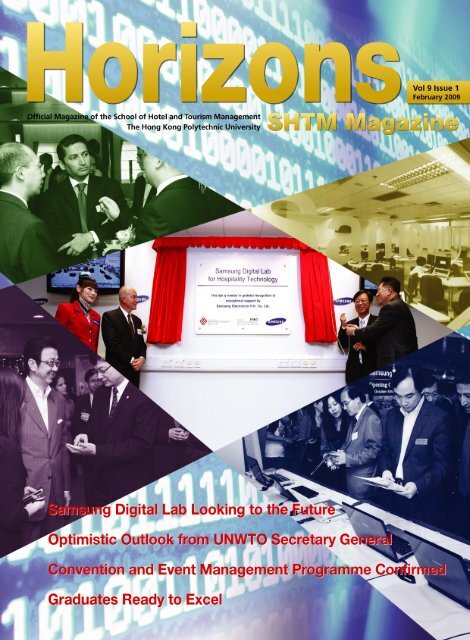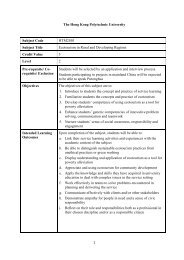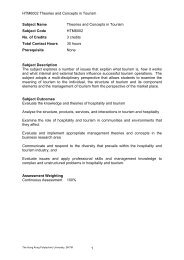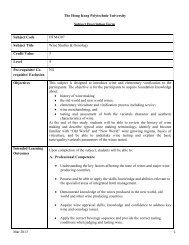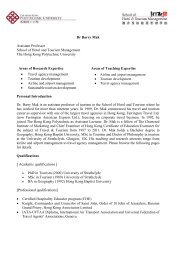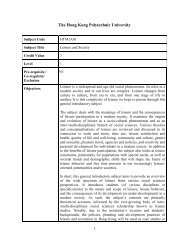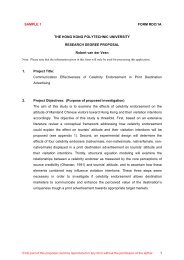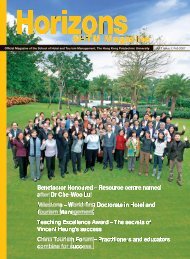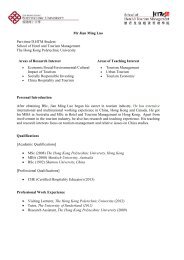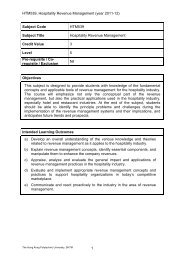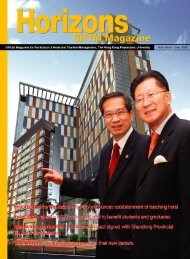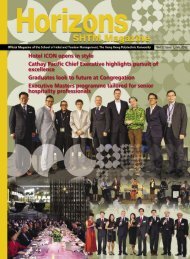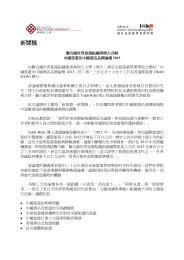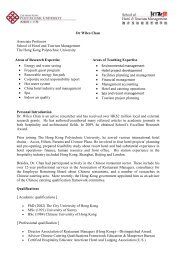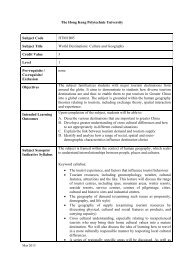Vol 9 Issue 1, February 2009 - School of Hotel & Tourism ...
Vol 9 Issue 1, February 2009 - School of Hotel & Tourism ...
Vol 9 Issue 1, February 2009 - School of Hotel & Tourism ...
You also want an ePaper? Increase the reach of your titles
YUMPU automatically turns print PDFs into web optimized ePapers that Google loves.
2Director’s MessageMessage fromDirector <strong>of</strong> <strong>School</strong>As the SHTM enters the Year <strong>of</strong> the Ox we are drawing special pleasure from the transition. Thisyear marks our 30 th anniversary, and although that milestone is pushing our thoughts backacross a proud tradition it is also energising us as we look to the future.A particularly important way in which we are looking ahead is our partnership with Samsung ElectronicsHong Kong, highlighted in this issue. Our newly opened Samsung Digital Laboratory, stocked withIT and associated equipment donated by the company, is allowing students to experience the cuttingedge <strong>of</strong> hospitality and tourism industry applications even before they enter the employmentmarketplace.And those who do enter the marketplace find themselves ready to take on the world despite thecurrent economic downturn, as made clear in the coverage <strong>of</strong> our second independently conductedgraduate ceremony. We also cover the Chair Pr<strong>of</strong>essor’s Dinstinguished Lecture given by Mr FrancescoFrangialli, Secretary General <strong>of</strong> the United Nations World <strong>Tourism</strong> Organisation, who expressedsimilar optimism for the industry. Mr Frangialli has since received an Honorary Pr<strong>of</strong>essorship fromthe SHTM, and we look forward to further benefiting from his vast industry experience.Other features <strong>of</strong> this issue include coverage <strong>of</strong> the Fifth China <strong>Tourism</strong> Forum in Huangshan lastyear, with its focus on sustainable development, an account <strong>of</strong> how the industry has contributed toour new undergraduate conversion programme in convention and event management, highlights <strong>of</strong>the seventh Hong Kong Winter <strong>School</strong>, an update on the construction <strong>of</strong> our Teaching <strong>Hotel</strong> in TsimSha Tsui East, and details <strong>of</strong> the SHTM’s move into cyberspace with our Virtual <strong>Hotel</strong> project.We also feature our postgraduate programmes, <strong>of</strong>fering students the chance to comment on how theyhave developed and allowing programme leaders to discuss the ways in which they are helping toshape the leaders <strong>of</strong> tomorrow.As always, we are looking to the future today, expecting more success and ever-enhanced levels <strong>of</strong>excellence over the next 30 years.Pr<strong>of</strong>essor Kaye ChonChair Pr<strong>of</strong>essor and Director<strong>School</strong> <strong>of</strong> <strong>Hotel</strong> and <strong>Tourism</strong> ManagementThe Hong Kong Polytechnic UniversityHORIZONS
Samsung Digital Lab for Hospitality Technology3Pr<strong>of</strong>essor Kaye Chon, SHTM Director (left), with Mr BrianKim, President <strong>of</strong> Samsung Electronics Hong KongSamsung, the world-renowned electronic equipmentmanufacturer, is the new sponsor <strong>of</strong> the SHTM’sHospitality and <strong>Tourism</strong> Technology Unit. Renamed theSamsung Digital Lab for Hospitality Technology and stockedwith state-<strong>of</strong>-the-art electronic equipment and specialiseds<strong>of</strong>tware, the Lab is being redeveloped in two phases.The new facilities will ensure that students have access tothe latest technology available in the industry, highlightingthe <strong>School</strong>’s determination to remain at the forefront <strong>of</strong>technological change. With classes regularly held in the Lab,and Executive Development Programmes making use <strong>of</strong> thefacilities, a broad range <strong>of</strong> learners will benefit from theupgrade. The facilities will also be available to academic stafffor use in research projects.<strong>School</strong> <strong>of</strong> <strong>Hotel</strong> and <strong>Tourism</strong> Management
4Samsung Digital Lab for Hospitality TechnologyAn opening ceremony for the first stage, located in theexisting room on the <strong>School</strong>’s premises, took place on 30October 2008. Unveiling the new facilitates were Mr BrianKim, President <strong>of</strong> Samsung Electronics Hong Kong,Pr<strong>of</strong>essor Suleyman Demokan, PolyU Vice President(Academic Development), and Pr<strong>of</strong>essor Kaye Chon, SHTMDirector.Mr Kim remarked that “Samsung’s goal is to empower youngpeople with opportunities to excel and to benefit their localcommunities”. This, he said, would be the major benefit <strong>of</strong>the new facilities, which would help students to “reach theirfull potential and ultimately contribute to Hong Kong’ssustained status as an internationally competitive economy”.Built around the generous donation <strong>of</strong> 58 R-seriesnotebooks, the re-equipped Lab also features two networklaser printers, two LCD TVs, a DVD and a Blu-Ray discplayer, a surround sound system, a camcorder and an aircleaner.All <strong>of</strong> the computers run advanced s<strong>of</strong>tware thatfacilitates the teaching <strong>of</strong> subjects including lodgingmanagement, revenue management, financial management,e-business, technology management and data analysis forthe industry. The Lab’s seating has been reconfigured to makebest use <strong>of</strong> the new facilities.In his opening speech at the ceremony, Pr<strong>of</strong>essor Demokanpointed to the importance <strong>of</strong> PolyU achieving “academicexcellence in a pr<strong>of</strong>essional context”. One way <strong>of</strong> doing this,he said, was through “dedicated partnerships with business,the industry, the pr<strong>of</strong>essions and the community.” The Labis a leading example <strong>of</strong> such partnerships in action.Pr<strong>of</strong>essor Chon explaining the Lab facilities to Mr KimWhen asked about the importance <strong>of</strong> the facilities, Pr<strong>of</strong>essorChon mentioned that SHTM students would “gain handsonexperience with industry booking and enquiry s<strong>of</strong>tware,as well as the application <strong>of</strong> information technology inhospitality”. This is clearly an important feature, and befitsthe <strong>School</strong>’s status as Asia’s leading hospitality and tourisminstitution.The second phase <strong>of</strong> the Lab’s redevelopment will take placein 2010 when the SHTM moves to the new Teaching <strong>Hotel</strong>in Tsim Sha Tsui East. Currently under construction, the<strong>Hotel</strong>’s role as a ‘house <strong>of</strong> innovation’ will be enhanced bythe use <strong>of</strong> Samsung equipment throughout. Of particularsignificance will be the use <strong>of</strong> next-generation Samsungtechnology in the prototype rooms, and the relocation <strong>of</strong>the Digital Lab to the hotel.Assistant Pr<strong>of</strong>essor Norman Au, who oversees the Lab, saidthat “with the increased importance <strong>of</strong> technology inhospitality, we will again step-up our facilities by partneringwith Samsung”. In the new teaching hotel, Samsung willprovide cutting-edge telecommunications equipment, arange <strong>of</strong> LCD screens for teaching, use in conferences anddisplays in public areas, the <strong>Hotel</strong>’s CCTV security systemand data network infrastructure for Internet access and otheremerging applications.This will be just another example <strong>of</strong> Samsung’s commitmentto the future, with the company no stranger to lastingpartnerships with educational institutions – its Hope forEducation programme in the United States supports primaryand secondary schools with the latest technology through anation-wide essay competition.Unveiling the plague to mark the opening <strong>of</strong> the Samsung Digital Lab forHospitality TechnologyAs the SHTM moves further up the global rankings andconsolidates its leading position amongst similar institutionsin Asia, the partnership with Samsung will be vital. Industrypartners and their commitment to education are the key tothe <strong>School</strong>’s success, and each step we take into the futurewill be shared with them.HORIZONS
Congregation 20085Time to Excel for GraduatesThe SHTM’s second independently held Congregationtook place amid delight from graduates, family, invitedguests and academic staff on 11 November last year. Heldin two sessions to accommodate the 626 students awaitingconferral <strong>of</strong> their diplomas and degrees, the event concludedwith 5 PhD, 1 MPhil, 151 MSc, 2 PgD, 209 BSc, 78 BAand 180 HD graduates.Both sessions began with the now customary parade <strong>of</strong>students and staff in their academic robes from the ChewooLui <strong>Hotel</strong> and <strong>Tourism</strong> Resource Centre to the JockeyClub Auditorium, led by two bagpipers in full Scottish dress.The spectacle was a fitting way to mark what SHTM ChairPr<strong>of</strong>essor and Director Kaye Chon described as the“culmination <strong>of</strong> the <strong>School</strong>’s academic activities” for the year.PolyU Vice President (Research Development) andChairman <strong>of</strong> the Board <strong>of</strong> <strong>School</strong> <strong>of</strong> the SHTM Pr<strong>of</strong>essorAlbert Chan opened both sessions, with themorning session also addressed by Miss AuKing-chi, Hong Kong’s outgoingCommissioner for <strong>Tourism</strong>. Miss Au notedthat the Congregation encapsulated manythings that made her proud <strong>of</strong> Hong Kong,such as “the pursuit <strong>of</strong> learning andexcellence, an ability to createopportunities, an international outlook anda willingness to embrace challenges”.Her main advice focused on those challenges, specificallythe increasing level <strong>of</strong> competition for tourists in the regionand the potential effects <strong>of</strong> the global financial crisis. “Wewill”, she said, “require all your resourcefulness, enterprise,imagination, enthusiasm and energy to succeed”. Speakingto first-time graduates in particular, she pointed topossibilities in the future. “A first degree is a great asset, butto reap the full rewards it must be accompanied by a longtermcommitment to self-improvement.”Shannon Cheung, a BSc(Hons) in <strong>Tourism</strong> graduate andnow a Management Trainee with Swire Travel, <strong>of</strong>fered similarobservations in a speech on behalf <strong>of</strong> graduating studentsduring the session. Recalling how SHTM pr<strong>of</strong>essors wereeager to help students learn from their own mistakes, shecautioned that “in the real world the story is different”.Reflecting on the service excellence she experienced as anintern in Hawaii, she said that graduates needed tounderstand why they are in the industry.“We are here to help”, she said, “and weshould take care <strong>of</strong> all tiny details in ourservice encounters”.Miss Au King-chi speaking to the students“The world”, exhorted Ms Cheung, “iswaiting”, and it certainly was for MrJeremy Xu, who graduated from theSHTM with an MSc in <strong>Hotel</strong> and <strong>Tourism</strong>Management in 2004. Mr Xu received the<strong>School</strong> <strong>of</strong> <strong>Hotel</strong> and <strong>Tourism</strong> Management
6Congregation 2008In spite <strong>of</strong> the currenteconomic backdrop, there willalways be companies looking“to employ great candidates.”Marching to the Hong Kong Jockey Club Auditorium2008 Outstanding Alumni Award during the session, forhis contributions to both the <strong>School</strong> and the industry.Having served as General Manager for hotels in mainlandChina and Hong Kong for 11 years, he is now Vice President<strong>of</strong> the China National Travel Service (HK) GroupCorporation and Executive Director <strong>of</strong> China TravelInternational Investment H.K.After the formalities <strong>of</strong> opening the afternoon session, MrBill Ernest, President and Managing Director, Asia, for WaltDisney Parks and Resorts, shifted attention from the regionto the world. He began by complimenting the <strong>School</strong>’s “fineteaching staff and high calibre students”, and sounded theoptimistic note that “people will continue to travel” duringthe current financial crisis.Mr Ernest remarked that “in spite <strong>of</strong> the current economicbackdrop, there will always be companies looking to employgreat candidates”. He reminded each graduate that they wereauthors <strong>of</strong> their own life stories, which could well lead themto unexpected destinations. “That is the beauty <strong>of</strong> the careerthat you are about to embark on”, he said, “it could takeyou anywhere across the globe”.Speaking for the graduating students during the session,Ms Greta Hung, a BSc(Hons) in <strong>Hotel</strong> Managementgraduate, thanked the <strong>School</strong> for the encouragement andopportunities that it <strong>of</strong>fered, and concluded thatinternational exposure through a study trip to Egypt hadimportantly allowed her to “understand more about thelocal customs and practices” that differed from those <strong>of</strong>Hong Kong.Mr Bill Ernest speaking about opportunities for graduatesWith this sort <strong>of</strong> perspective, and with the background <strong>of</strong>an outstanding education, Ms Hung excitedly told herfellow graduates that it was “time for us to excel!” TheSHTM <strong>of</strong>fers its congratulations to all 626 graduates, andlooks forward to hearing the stories <strong>of</strong> their success in thecoming years.HORIZONS
Chair Pr<strong>of</strong>essor’s Distinguished Lecture7A Time <strong>of</strong>Caution andOptimismInvaluable advice to students is a hallmark <strong>of</strong> the Chair Pr<strong>of</strong>essor’s DistinguishedLectures, and never more so than when the global economy is in a downturn.Speaking <strong>of</strong> the tourism industry’s resilience on 26 November last year, MrFrancesco Frangialli, United Nations World <strong>Tourism</strong> Organisation (UNWTO)Secretary General and since named SHTM Honorary Pr<strong>of</strong>essor, expressedoptimism. “Experience teaches us that tourism is resilient”, he said, with thedesire to travel not easily sated in post-industrial societies. Yet he also cautionedthat the double-digit growth in tourism demand over recentyears would not be repeated again soon.Mr Frangialli has been at the helm <strong>of</strong> the UNWTO since 1997,during which time he has overseen the creation <strong>of</strong> a universallyaccepted system that assesses tourism’s economic importanceto national economies and the adoption <strong>of</strong> the Global Code <strong>of</strong>Ethics for <strong>Tourism</strong>. His extensive background in publicadministration has also served him well, and he speaks withauthority on the resilience <strong>of</strong> tourism to economic turmoil.Pointing to the growing implications <strong>of</strong> the global financial crisis, Mr Frangialliremarked that “international tourism will undoubtedly be affected, but it is ourconviction that it still has a bright future ahead <strong>of</strong> it!” <strong>Tourism</strong> demand would beexpressed in different forms. He specifically pointed to the “contribution <strong>of</strong>tourism flows coming from emerging countries”, including China.Pr<strong>of</strong>essor Kaye Chon, SHTM Director, presentingthe Certificate <strong>of</strong> Appointment to Mr FrancescoFrangialliThis would lead to a moderation <strong>of</strong> growth in the industry, but would ultimatelyleave it more robust. Mr Frangialli emphasised the growing concern in both thepublic and private sectors about anticipating economic difficulties andovercoming them quickly. He also commented on the importance <strong>of</strong>sustainability – an issue that the UNWTO is addressing with its focus onhalting climate change and reducing extreme poverty.The organisation has been working with public bodies aroundthe world since 2002 to address the impact <strong>of</strong> human activity onthe environment, and launched its ST-EP initiative to eliminatepoverty through sustainable tourism in 2003. Mr Frangiallimentioned that the UNWTO now has more than 60 ST-EPprojects in progress, spanning Africa, Asia and Latin America.Impressing the students with the breadth <strong>of</strong> his vision, Mr Frangialliengaged them in a lively discussion after the lecture. Those incharge today certainly have much wisdom to <strong>of</strong>fer the leaders <strong>of</strong>tomorrow.<strong>School</strong> <strong>of</strong> <strong>Hotel</strong> and <strong>Tourism</strong> Management
8Fifth China <strong>Tourism</strong> ForumFocus on Nature at <strong>Tourism</strong> ForumThe fifth China <strong>Tourism</strong>Forum, held inHuangshan, Anhui Province on13-14 December last year,turned the attention <strong>of</strong>government <strong>of</strong>ficials, industrypr<strong>of</strong>essionals, academics andstudents towards nature-basedtourism. Set in one <strong>of</strong> China’smost picturesque areas, theForum was co-organised by theSHTM, the World <strong>Tourism</strong>Organisation (UNWTO) and the <strong>Tourism</strong> College <strong>of</strong>Huangshan University.In his opening remarks, SHTM Chair Pr<strong>of</strong>essor and DirectorKaye Chon noted that although China has many world-classnatural attractions, “it is vital for local communities,governments as well as tourism practitioners to work togetherto ensure their preservation and sustainability”.Panel Discussion II, featuring (from left) Mr Tony Tse, Pr<strong>of</strong>essorKaye Chon and Dr David Jones <strong>of</strong> the SHTM, with Pr<strong>of</strong>essorWenwei Fu and Pr<strong>of</strong>essor Hao ZhangThe second day began with akeynote presentation byPr<strong>of</strong>essor Bruce Prideaux fromJames Cook University inAustralia on critical issues for thesustainability <strong>of</strong> mountaindestinations. Pr<strong>of</strong>essor Tiger Wu<strong>of</strong> Peking University thendiscussed strategies for and themeasurement <strong>of</strong> nature-basedtourism around cities.Panel sessions over the two days covered nature-basedtourism in greater depth, and took in crisis management fortourism, post-Olympic tourism, and the importance <strong>of</strong>listening to employees. A number <strong>of</strong> papers were alsopresented, with speakers including academics, students,representatives from hospitality companies and government<strong>of</strong>ficials from the Huangshan Municipal Office and thenational and regional tourism administrations.During the closing session, the distinguished scholarPr<strong>of</strong>essor Zhang Guangrui received a Lifetime AchievementAward in <strong>Tourism</strong> Education and Research in China,recognising his significant contribution to the field.Pr<strong>of</strong>essor Chris Ryan speaking on corporate social responsibilityHighlighting the complexity <strong>of</strong> that sustainability, theSHTM’s Pr<strong>of</strong>essor Bob McKercher focused on the difficulty<strong>of</strong> reconciling its economic and environmental aspects inhis opening keynote presentation. Providing an historicaloverview <strong>of</strong> ecotourism from the idealism <strong>of</strong> the 1980s tothe current “crisis <strong>of</strong> legitimacy”, he called for thedevelopment <strong>of</strong> sustainability indicators, codes <strong>of</strong> practiceand eco-labels.Continuing with this theme <strong>of</strong> reassessment in the secondkeynote speech, Pr<strong>of</strong>essor Chris Ryan <strong>of</strong> the WaikatoManagement <strong>School</strong> in New Zealand described how thetourism industry needed to embrace corporate socialresponsibility to ensure its sustainability.The sixth China <strong>Tourism</strong> Forum will be co-hosted by theSHTM, the UNWTO and the Sichuan <strong>Tourism</strong>Administration. To be held in Chengdu, Sichuan Province,on 12-13 May <strong>2009</strong>, it will mark the first anniversary <strong>of</strong>revitalisation efforts after the devastating earthquake in theregion.Mr Yuyan Miao, representative <strong>of</strong> the Sichuan <strong>Tourism</strong> Administration, withPr<strong>of</strong>essor ChonHORIZONS
Convention and Event Management9With the spread <strong>of</strong> convention and event management as a specialist fieldin Asia there is a pressing need to train the right people to satisfy industrydemand. Mindful <strong>of</strong> Hong Kong’s push to strengthen its leading position in themarket, the SHTM has been collaborating with the industry to devise aninnovative new approach to educating the next generation <strong>of</strong> convention andevent managers.Industry and SHTM members <strong>of</strong> the taskforceA feature <strong>of</strong> the recently approved BSc in Convention and Event Managementconversion programme is that it has responded to industry needs from inception.Undergraduate Programme Director, Dr David Jones has described the processas “unique and progressive”, with industry involvement in developing thecurriculum a vital aspect <strong>of</strong> the programme’s relevance.To be launched in the <strong>2009</strong>-2010 academic year, thiswill be a conversion programme targeting holders <strong>of</strong>Higher Diplomas and Associate Degrees, and “otherswho want to complete their bachelor degrees in theconvention and event management area”.Last year the <strong>School</strong> convened a taskforce comprisingSHTM faculty members and leading industry figures todeliberate on the convention and event focus <strong>of</strong> boththe new programme and the Executive DevelopmentProgrammes that it provides to the industry.Let the Industry LeadIn what Dr Jones described as “a co-creation session” the industry members<strong>of</strong> the taskforce were initially asked to outline “what competencies the industrywould want from a student graduating from PolyU with a degree in thisfield.” Their recommendations were developed into subject proposals, whichwere then taken back for further input until the faculty members on the taskforcecould produce a series <strong>of</strong> new subjects.Dr Jones explained that the newly developed subjects would cover the broadareas <strong>of</strong> meeting planning, exhibition management, venue management, andconvention sales and service. One <strong>of</strong> the new subjects has already been incorporatedinto the existing BSc in <strong>Hotel</strong> and <strong>Tourism</strong> Management programme.Held over two semesters, the new subject is involving students at every step <strong>of</strong>the convention planning process. The focus this year will be on the InternationalConvention and Expo Summit <strong>2009</strong>, with the students completely responsiblefor planning the event.<strong>School</strong> <strong>of</strong> <strong>Hotel</strong> and <strong>Tourism</strong> Management
Executive Programme in Hospitality Management11Hong Kong Winter <strong>School</strong>Warms to Knowledge SharingVice President <strong>of</strong> Sales and Marketingat Kimpton <strong>Hotel</strong>s, discussedmarketing as a core business strategyduring the second session. Using hischain as a case study, he explored themarketing disciplines at work and theimportance <strong>of</strong> emotional connectionswith guests.Mr Steve Pinetti (centre) with participantsThe seventh annual Hong Kong Winter <strong>School</strong>,organised by the SHTM and the Hong Kong <strong>Hotel</strong>sAssociation, and sponsored by the Pacific Asia TravelAssociation (PATA) and Marco Polo <strong>Hotel</strong>s, was held oversix days in January. Attracting participants from Hong Kong,the Chinese mainland, Taiwan and Thailand, this year’s eventwas also attended by participants from Cambodia and SriLanka, both sponsored by PATA.Featuring the results <strong>of</strong> cutting-edge research and the use <strong>of</strong>advanced management tools, the Hong Kong Winter <strong>School</strong>prepared senior executives from the hospitality sector to makestrategic contributions to their organisations. The focus wason the core concepts <strong>of</strong> marketing and brandingmanagement, hotel sales and revenue management, andhuman resource management. Each concept was the theme<strong>of</strong> a two-day workshop split into two one-day sessionsdelivered by leading academics and senior industrypractitioners.Pr<strong>of</strong>essor Cathy Hsu, SHTM Associate Director, kicked <strong>of</strong>fthe Marketing and Branding Management Workshop witha session on winning strategies for hotel branding, leadingparticipants through interactive exercises covering brandassociation, naming and identity. Mr Steve Pinetti, SeniorThe <strong>Hotel</strong> Sales and RevenueManagement Workshop began with asession on sales operations in acompetitive environment. TheSHTM’s Dr David Jones focused onbringing out the effectiveness <strong>of</strong> eachmember in the hotel sales team,covering priorities and sales and serviceroles. Dr Ruhi Yaman, VisitingAssociate Pr<strong>of</strong>essor at the SHTM, <strong>of</strong>fered another way <strong>of</strong>approaching the topic, by analysing demand behaviour,demand distribution and price discrimination.A Human ResourceManagement Workshoprounded out the sixdays, with Ms DeannaMcGonigal, Director <strong>of</strong>Human ResourcesDevelopment at MarcoPolo <strong>Hotel</strong>s, discussingthe importance <strong>of</strong>succession planning andhow an effective plancould be developed.Pr<strong>of</strong>essor Robert Bosselman speaking atthe final sessionPr<strong>of</strong>essor Robert Bosselman <strong>of</strong> Iowa State University spokethe next day on managing with integrity in the workplace.His session fostered the development <strong>of</strong> personal and socialresponsibility in participants through real-life examples.Continuing this tradition <strong>of</strong> excellence in the provision <strong>of</strong>Executive Development Programmes, the SHTM will hostthe eighth Hong Kong Winter <strong>School</strong> in January 2010.<strong>School</strong> <strong>of</strong> <strong>Hotel</strong> and <strong>Tourism</strong> Management
12SHTM Teaching <strong>Hotel</strong>Construction is progressing on the SHTM’s Teaching <strong>Hotel</strong> in Tsim ShaTsui East, and the internal design is being fine-tuned to emphasiseenvironmental friendliness. As the podium floors start to rise, with the basementfloors now finished, the <strong>School</strong> is anticipating completion <strong>of</strong> the constructionphase late in the year.A foundation stone laying ceremony took place on 22 December last year,<strong>of</strong>ficiated by then PolyU President, Pr<strong>of</strong>essor Poon Chung-kwong. Recalling hislong-term support for the <strong>Hotel</strong>, Pr<strong>of</strong>essor Poon remarked that he had “no doubtthat this future landmark will attract world-class teaching staff as well as qualitystudents from around the globe to PolyU in the years to come”.Living FeaturesPolyU President Pr<strong>of</strong>essor Poon Chung-kwong(seventh from right) with SHTM staff andindustry guests at the <strong>Hotel</strong> site.Work has now commenced on the ground to ninth floors; the tower sectionfrom the tenth to the twenty-fifth floors will be completed by October. The<strong>School</strong>, in conjunction with PolyU, expects to hold a completion ceremony latein the year.When the construction phase is completed, attention will shift to the internal fitout, with the lobby serving as a focal point for eco-friendly design. Instead <strong>of</strong>using marble and stone walls alone – common elements in local hotels – thelobby will feature a living green wall, 11 metres wide and 18 metres tall. Greetingeveryone who enters through the main doors, this wall will be covered in variousspecies <strong>of</strong> plants, <strong>of</strong>fering not only a beautiful complement to the reception areabut also functioning as a thermal insulator and air-freshener.Further eco-friendly features will include a solar assisted hot-water system, anenergy-saving heat pump system and a heat recovery system, amongst otherinitiatives. The aim will be to create a showpiece <strong>of</strong> environmental awareness,and a model for how the industry can colour its future green.PolyU is currently inviting industry and business partners to play a role in thatfuture and in helping to enhance the hospitality and tourism industry overallthrough Teaching <strong>Hotel</strong> sponsorships. A number <strong>of</strong> opportunities are available,including sponsorships for the naming <strong>of</strong> facilities, sponsorships for equipmentand facilities, and sponsorships for research and scholarship.For further information on sponsorship opportunities, please contact theSHTM’s Senior Project Manager (<strong>Hotel</strong> Development) Mr Ian Lee athmil@polyu.edu.hk, or by phone at 3400 2632.HORIZONS
Virtual <strong>Hotel</strong> Project13Another Dimension <strong>of</strong> LearningThe SHTM’s Virtual <strong>Hotel</strong> project adds“another dimension” to hospitality andtourism education according to Mr PaulPenfold, Manager (Educational Development),who has been instrumental in introducingstudents to the possibilities <strong>of</strong> learning online.Since 2007, Mr Penfold and his team havedeveloped three educational ‘islands’ in the virtualworld <strong>of</strong> Second Life, featuring a virtual PolyUCampus, four hotels, a conference centre, a corporateyacht, and a replica <strong>of</strong> thePolyU Teaching <strong>Hotel</strong>.Second Life is an immersiveonline world in which users,through their animated‘avatars’, can move acrossvirtual scenes, talk to eachother and interact with theirsurroundings. An immediate“The experience andlearning has been verygood and academicshave been very willingto experiment and trynew ideas.”benefit <strong>of</strong> this for tourism students is the ability to ‘visit’ famous destinationswithout having to leave the computer lab. Mr Penfold described the experience<strong>of</strong> 90 first year students in the International <strong>Tourism</strong> Destinations Class, whowere given the task <strong>of</strong> fact finding in replicas <strong>of</strong> real world attractions. They “metseveral people, actually made friends with people” from around the world, hesaid, and “came out with lots <strong>of</strong> stories and information”.That sort <strong>of</strong> experience is priceless for new students, and the benefits extend tothose more focused on hospitality. Last year, the 75 students in the <strong>Hotel</strong> FacilitiesManagement and Design class were given the opportunity to create virtual guestrooms. Choosing their own styles, furnishings, and colour schemes, they thenpresented the designs to the rest <strong>of</strong> the class, explaining the concepts and replyingto critiques from fellow students.SHTM academics have been using Second Life in ways such as these over the lasttwo semesters, and are set to escalate those efforts in the future. Mr Penfold wasvery positive about the future benefits <strong>of</strong> virtual learning at the <strong>School</strong>. Hementioned that MICE subjects, in particular, were well suited to Second Life,because the <strong>School</strong> could hold virtual exhibitions, run meetings and holdconventions more easily than it could in the real world, with fewer boundaries <strong>of</strong>time and travel.Despite the obvious challenge <strong>of</strong> adjusting to this innovation, Mr Penfoldremarked that “the experience and learning has been very good and academicshave been very willing to experiment and try new ideas”. Fittingly for a school atthe forefront <strong>of</strong> hospitality and tourism education, he described the efforts as“breaking new ground”.<strong>School</strong> <strong>of</strong> <strong>Hotel</strong> and <strong>Tourism</strong> Management
14Postgraduate ProgrammesLearningat aHigher LevelAs the focus <strong>of</strong> world tourism shifts to Asia and the SHTMconsolidates its role at the forefront <strong>of</strong> hospitality andtourism institutions in the region, new opportunities are emerging forpostgraduate education in Hong Kong. With cutting edge Master <strong>of</strong> Science,Master <strong>of</strong> Philosophy and Doctor <strong>of</strong> Philosophy programmes, and the world’sfirst pr<strong>of</strong>essional Doctorate in <strong>Hotel</strong> and <strong>Tourism</strong> Management degree, the SHTMis ensuring that students recruited from around the world have the opportunityto benefit from the industry’s Asian wave.With an emphasis on developing leaders in the field by blending academicchallenges and practical contexts, the MSc in <strong>Hotel</strong> and <strong>Tourism</strong> Managementprogramme <strong>of</strong>fers a coursework-oriented curriculum that is always responsive toindustry needs. When asked about recent MSc highlights, Programme Leaderand Assistant Pr<strong>of</strong>essor Sylvester Yeung <strong>of</strong>fered what would otherwise seem amodest achievement: the programme had undergone “minor curriculum revisions”to ensure that it would keep pace with the changing employment circumstancesthat students were likely to find themselves in.One <strong>of</strong> those students, Ms Kate Yang, had certainly benefited from that constantdrive for relevance. She remarked that “the curriculum is powerful and is furtherstrengthened by the <strong>School</strong>’s close ties with industry”. Ms Do-Hee Kim, who isstudying in the part-time mode, added that the programme had given her “anopportunity to develop a more advanced understanding <strong>of</strong> hotel and tourismmanagement”. Recommending the SHTM toothers seeking to further their careers in theindustry, Ms Kim explained that her studies hadinstilled in her a dual “sense <strong>of</strong> pr<strong>of</strong>essionalresponsibility and personal fulfilment”.That atmosphere <strong>of</strong> achievement is a feature<strong>of</strong> all SHTM graduate programmes, and isenhanced by an international outlook secondto none. Commenting on the abundantresources available in her research-orientedprogramme, MPhil student Ms Sarah Wangexpressed appreciation for the funding shereceived to attend and present papers atconferences in both France and Singapore, whereshe “met with scholars and students from differentparts <strong>of</strong> the world”.HORIZONS
Postgraduate Programmes15Similar opportunities are available every day in the SHTM itself. Addressingprospective students, PhD candidate Mr Alexander Grunewald observed that“you will find internationally trained academics to interact with and excelintellectually, and a cosmopolitan culture inwhich to develop personally”. Studentrecruitment from around the world is a priority,with MPhil and PhD programme leader, SHTMAssociate Director Pr<strong>of</strong>essor Haiyan Song,explaining the <strong>School</strong>'s goal from a typically wideperspective.“The main objective for the next few years willbe to attract more international students to studyin Hong Kong”, he said. This will be in line withthe Hong Kong government’s stated aim <strong>of</strong>creating “an education hub in the Asia-Pacific region”, and will further enhancethe already strong international orientation <strong>of</strong> the student body in a well known“research centre <strong>of</strong> excellence”.Enhance my globalperspective <strong>of</strong> hoteland tourismmanagement with anemphasis on Asia.“”DTHM student Sharon Pang, who has been living inthe United States for the last 10 years, observed a similareffect in the groundbreaking pr<strong>of</strong>essional doctorateprogramme, noting that it would “enhance my globalperspective <strong>of</strong> hotel and tourism management with anemphasis on Asia”. She went on to praise a “trulyinnovative programme” that was“reducing the gap betweenpractitioners and educators orresearchers”.The DHTM programme isdesigned to do just that, withProgramme Leader Pr<strong>of</strong>essor BobMcKercher commenting that hisinterest was to recruit “qualitystudents, not quantity students”. Attracting experiencedpractitioners, government representatives and academicswanting to enhance their careers, students recruited overthe two years the programme has been <strong>of</strong>fered have hailed from Ghana, Japan,Macau, mainland China, South Korea, Taiwan and the United States.With a pronounced dedication to their studies, these students have thrived in anatmosphere in which creativity is at a premium and innovation is expected.Describing his experience in the programme, Mr Jose But remarked that the“pr<strong>of</strong>essors have a talent for presenting challenging ideas that force students into ahigh level <strong>of</strong> thinking”. As in all <strong>of</strong> the SHTM’s postgraduate programmes, theobjective is to push back the boundaries <strong>of</strong> teaching, learning and research, <strong>of</strong>feringstudents the opportunity to position themselves at the industry’s cutting edge.<strong>School</strong> <strong>of</strong> <strong>Hotel</strong> and <strong>Tourism</strong> Management
Research HorizonsHighlights <strong>of</strong> Recent Research by the SHTM<strong>Vol</strong>ume 3. <strong>Issue</strong> 1. <strong>February</strong> <strong>2009</strong>Practical <strong>Tourism</strong> Demand ForecastingSystem DevelopedRecognising the fundamental importance <strong>of</strong> demand to alltourism-related business decisions, the SHTM’s Pr<strong>of</strong>essorHaiyan Song, Visiting Pr<strong>of</strong>essor Stephen Witt and Post-Doctoral Fellow Xinyan Zhang describe how they developeda web-based tourism forecasting system in a recentlypublished research paper. The value <strong>of</strong> such a system, theywrite, is in the scope it allows forecasters to generate theirown ‘what if?’ scenarios. Describing an easily accessed,modular online system that supports scenario analysis and“real-time judgemental contributions <strong>of</strong> experts in the field”,the researchers outline a two-stage methodology withpractitioners firmly in mind.Practical ForecastingAlthough a number <strong>of</strong> forecasting methods have beendeveloped in the academic literature, they are not readilyaccessible by the people who could most benefit from them.To address this problem, the researchers envisaged aforecasting system that would “facilitate the transfer <strong>of</strong>information and knowledge from the experts in tourismforecasting to practitioners in the tourism industry”. This,they note, necessitates a system that “not only integratesthe advantages <strong>of</strong> modern forecasting methods and scenarioanalysis, but also allows for a prompt judgementalcontribution from a wide range <strong>of</strong> experts”.Added benefits would include the use <strong>of</strong> a familiar Webbasedenvironment at low cost, continuously updatedforecasting models and “improved collaboration amongststakeholders”.Hong Kong is an ideal setting in which to develop thatsystem because tourism is its second largest foreign incomeearner and contributes around 8 % <strong>of</strong> local GDP. Withapproximately 25 million tourist arrivals a year, demandforecasting is crucial to budgeting and planning for themany tourism-related businesses. According to theresearchers, “Hong Kong faces the critical problem <strong>of</strong>creating and maintaining a sustainable competitiveadvantage”. This challenge can be met through a Web-basedsystem that enhances “policy formation and decisionmaking” for government representatives, industrypractitioners, consulting firms and tourism researchers.Industry-Focused System MethodologyFocusing on “the relationship between demand for HongKong tourism and its influencing factors”, the researchersidentify the specific outputs that would be needed fromthe system on a quarterly basis. These include tourist arrivalsand expenditures by source market up to 10 years ahead,demand for hotel rooms by room type and source marketup to five years ahead, tourist expenditure onaccommodation, retail products, restaurant meals andtransport by source market up to five years ahead, and HongKong’s outbound tourism to key destinations.<strong>School</strong> <strong>of</strong> <strong>Hotel</strong> and <strong>Tourism</strong> Management1
<strong>Vol</strong>ume 3. <strong>Issue</strong> 1. Feb <strong>2009</strong>Research HorizonsThe forecasting process occurs in two stages, with the firstinvolving the use <strong>of</strong> econometric models to producestatistical forecasts. The variables include tourism demandas measured by tourist arrivals from a particular origin, thecost <strong>of</strong> living for tourists in Hong Kong, the price <strong>of</strong> tourismproducts that could be substitutable for a stay in Hong Kongand the income level in the country or region <strong>of</strong> origin.The source markets, constituting 85.5% <strong>of</strong> tourist arrivalsin Hong Kong, include the Chinese mainland, Taiwan,Japan, the USA, South Korea, Singapore, Macau, Australia,the UK and the Philippines.When a forecast for one <strong>of</strong> these source markets is producedit becomes the initial input for a second stage, in which apanel <strong>of</strong> 12 tourism experts adjust it “according to theirintuition, experience and practical knowledge”. The expertsare anonymous practitioners, public servants and academicswho provide their judgements over two rounds <strong>of</strong> the samesurvey through a Web page. Feedback is provided by anadministrator after the first round, to help narrow downthe resulting judgemental forecasts.Ease <strong>of</strong> UseWhen the complete quarterly forecasts have been generated,general users and subscribers can access them from theirown computers. The researchers note that general users canonly access annual statistical forecasts <strong>of</strong> tourist arrivals, butsubscribers have access to all <strong>of</strong> the statistical andjudgemental forecasts, and can perform scenario forecastingthemselves. In the scenario analysis, the original statisticalforecasts can be used “as benchmarks against which toportray other possible scenario forecasts”, with a standardset <strong>of</strong> two optimistic scenarios and two pessimistic scenariosand the ability to accept user-defined scenarios.Future ApplicationsLooking to the future, the researchers note that “Hong Kongtends to be over-responsive to market conditions”. Withthe various tourism sectors vulnerable to economic cycles,a forecasting system easily accessible by policymakers andindustry strategists will help to minimise the impact <strong>of</strong>foreseeable fluctuations. The researchers are considering theaddition <strong>of</strong> new forecasting methods to the system to furtherstrengthen its demand forecasts and the scenario analysisprocess, and the possibility <strong>of</strong> incorporating user feedbackinto the expert judgment stage, amongst other refinements.The aim will always be to enhance the long-termdevelopment <strong>of</strong> the tourism industry in Hong Kong.Points to Note:■■■■Demand forecasting is crucial for all tourismrelated sectors.Hong Kong’s tourism industry, however, lacks ademand forecasting system.An easy to use Web-based forecasting system canenhance tourism policy and decision making.The Hong Kong <strong>Tourism</strong> Demand ForecastingSystem combines statistical forecasts, expertjudgements and user-defined scenario analysis inan industry focused Web service.Song, Haiyan, Witt, Stephen F., and Zhang, Xinyan (2007).Developing a Web-based Demand Forecasting System.<strong>Tourism</strong> Economics, <strong>Vol</strong>. 14, No. 3, 445-468.The homepage itself is set out in an easy-to-use manner,with all functions clearly labelled in the left-hand columnand the main operations, including user input and systemoutput, covering the rest <strong>of</strong> the screen. The various functionsare presented intuitively, with the arrival forecastinginterface, to give a prominent example, allowing users toselect a forecasting period from a drop-down box and thenchoose origin countries or regions by clicking on theappropriate check boxes. The output is provided in tabularformat for general users, and in graphical form forsubscribers once they log in to the system.2 <strong>School</strong> <strong>of</strong> <strong>Hotel</strong> and <strong>Tourism</strong> Management
Research Horizons <strong>Vol</strong>ume 3. <strong>Issue</strong> 1. Feb <strong>2009</strong>Distance Limits Travel DemandA great majority <strong>of</strong> international travel occurs within1,000 kilometres <strong>of</strong> the source market’s border claim theSHTM’s Pr<strong>of</strong>essor Bob McKercher, Assistant Pr<strong>of</strong>essorAndrew Chan and Ms Celia Lam. Seeking to test the validity<strong>of</strong> the distance decay theory, or the expectation that“demand for any good or service should declineexponentially as distance increases”, the researchers reasonthat all destinations close to source markets “should havean inherent advantage over more distant destinations”. Thishas obvious implications for destination marketing, so theyinvestigate its plausibility when individual origindestinationrelationships are considered.Demand DecayPut simply, distance decay is a way <strong>of</strong> explaining the“gravitational pull” <strong>of</strong> nearby destinations, but it is has notreceived significant attention in recent years because moresophisticated methods <strong>of</strong> forecasting tourist flows have beendeveloped. Yet destination choice, as the researchers remindtheir readers, “is a complex and <strong>of</strong>ten messy process”, andthere can be variation in the rate at which distance reducesdemand. The relationship between each point <strong>of</strong> origin andpossible destinations seems to have the most influence onthe way demand changes as distance increases.The researchers outline three broad ways in which distancecauses demand to decay. The first is a relatively simplepattern in which demand peaks close to the traveller’s point<strong>of</strong> origin and then decreases at an ever accelerating rate “asthe perceived costs <strong>of</strong> travel distance and time increase”. Asecond pattern involves travellers having only a limitednumber <strong>of</strong> destination choices along a linear route, sodemand only decreases “after a certain threshold has beenreached”. The final pattern is similar to the first, withdemand clustered close to the point <strong>of</strong> origin, but there isalso a secondary peak caused by “very attractive” destinationsat a greater distance.The Significance <strong>of</strong> DistanceInvestigating outbound travel from 41 source markets to146 destinations in 2002, the researchers drew on data setsgathered by the United Nations World <strong>Tourism</strong>Organisation (UNWTO). All source markets that generatedat least a million departures were considered, with almost544 million arrivals registered in the destination markets,or 77.3% or the total yearly arrivals for all UNWTOmember nations. Most source markets had land neighboursas their nearest destination, and <strong>of</strong> the 41 markets 17 werein Europe and 13 were in Asia. The median number <strong>of</strong>origin-destination pairs for each source market was 45, sothese figures <strong>of</strong>fered a comprehensive guide to movementsbetween countries around the world.Distances between source markets and destinations werecategorised in 1,000 kilometre increments until 10,000kilometres, then in 2,000 kilometre increments up to14,000 kilometres and finally as “greater than 14,000kilometres”. Distances on the same continent werecalculated between nearest borders, and distances betweencontinents were calculated from country or region capitalto capital. Using these measures, the researchers note that57% <strong>of</strong> all travel is between land neighbours, and a further25% occurs up to 1,000 kilometres away from the sourcemarket.Destinations between 1,000 and 2,000 kilometres awayremain “somewhat attractive” according to the researchers,with demand declining sharply thereafter. If the sourcemarket is close to an area that attracts no tourists – such asan ocean, an otherwise unpopulated area or a country withvery different politics – travellers will extend the distance<strong>of</strong> their voyages, and this effect is even noticeable, thoughto a lesser extent, when the area is up to 3,000 kilometresaway. At distances <strong>of</strong> 4,000 kilometres or more, destinationmarkets with larger populations attract a relatively highproportion <strong>of</strong> travellers.Two exceptions to this pattern are Japan and Australia, withJapan having one demand peak for short-haul travel withinAsia and another for long-haul travel to the US, andAustralia showing distinct peaks in travel to the SouthPacific, Southeast Asia and Europe. Indeed, the patterns <strong>of</strong><strong>School</strong> <strong>of</strong> <strong>Hotel</strong> and <strong>Tourism</strong> Management3
<strong>Vol</strong>ume 3. <strong>Issue</strong> 1. Feb <strong>2009</strong>Research Horizonstravel from all source markets with “island status” indicatethat relative rather than absolute proximity could be adefining feature <strong>of</strong> access to destination markets.Despite Variation, a Short-Haul FocusGiven these variations in the way distance influencesdemand, the researchers suggest that distance decay is morea “generalisable concept” than a universal law. Destinationslocated more than 14,000 kilometres away from sourcemarkets, for instance, can sometimes attract up to 20% <strong>of</strong>the tourist flows from those markets. Spain and the UnitedStates are particularly strong in attracting long-haultravellers, the researchers observe. Nevertheless, there is anunderlying emphasis on short-haul travel, which the tourismindustry in general, and destination markets in particular,cannot afford to ignore.This warning is particularly significant for destinations thatare seeking to attract visitors from emerging source marketssuch as China, India and Russia. Regardless <strong>of</strong> how largethese markets are, nearby destinations will attract a majority<strong>of</strong> their demand and those further away will compete formuch smaller shares. Ultimately, write the researchers, “mostdestinations will receive greater returns on their marketingefforts and generate larger visitor numbers by focusing onnearby source markets and especially on immediate landneighbours”.Points to Note:■■■■Most international travel covers 1000 kilometresfrom the source market’s border or less.Demand for travel to a destination generallydeclines as the distance to it increases.That decline, however, can vary, especially forsource markets near areas with no tourism activity.Promotional efforts should nevertheless focus onneighbouring source markets.McKercher, Bob, Chan, Andrew and Lam, Celia (2008).The Impact <strong>of</strong> Distance on International TouristMovements. Journal <strong>of</strong> Travel Research, <strong>Vol</strong>. 47, No. 2,pp. 208-224.4 <strong>School</strong> <strong>of</strong> <strong>Hotel</strong> and <strong>Tourism</strong> Management
Research Horizons <strong>Vol</strong>ume 3. <strong>Issue</strong> 1. Feb <strong>2009</strong>Tour Leader Quality Crucial forTravel Agency ReputationTour leader quality, including attitude and pr<strong>of</strong>essionalability, has a direct bearing on travel agent reputation,according to research findings recently published by theSHTM’s Associate Pr<strong>of</strong>essor Vincent Heung. With aconcern for enhancing the industry’s understanding <strong>of</strong> “tourquality in the Chinese context”, Dr Heung surveyed touristswho participated in package tours organised by a large HongKong travel agency. He found that tour leaders’ pr<strong>of</strong>essionalattitude and knowledge, ability to communicate effectivelyand personal integrity all contributed to enhancing travelagent reputation and thus word-<strong>of</strong>-mouth publicity.The Importance <strong>of</strong> Tour LeadersThe quality <strong>of</strong> interactions with service personnel isparamount in creating satisfied customers who are likely to<strong>of</strong>fer repeat business. Yet, according to Dr Heung, thedynamics <strong>of</strong> this situation need further attention in thehospitality and tourism industry, “which is characterisedby intangibility, inseparability <strong>of</strong> production andconsumption, heterogeneity and perishability. This isparticularly true <strong>of</strong> package tours, on which touristsconsume a range <strong>of</strong> services, some not always evident, evenas they are produced.Tour leaders play a crucial role in defining how tourparticipants appreciate the overall service encounter, writesDr Heung, because they “ensure ‘what’ core service isdelivered and ‘how’ this core service is consumed”. At anygiven stage <strong>of</strong> a tour, the leader is an “information giver,instructor, motivator, ambassador, entertainer and leader”.Tour participants rely heavily on the leader for “almosteverything”, and the resulting trust is a crucial determinant<strong>of</strong> how participants perceive the whole tour.Measuring Tour Leader QualityDr Heung <strong>of</strong>fers three major constructs for measuring tourleader quality: core service delivery, customer orientationand communication effectiveness. Core service deliveryfocuses on the “essence <strong>of</strong> the service” and entails deliverywith consistency, regardless <strong>of</strong> what part <strong>of</strong> the service isdelivered. In this sense, a tour leader must ensure that allaspects <strong>of</strong> the tour are delivered well – a friendly leader willnot enhance a travel agency’s reputation, for instance, if heor she fails to follow the tour itinerary.Customer orientation entails “marketing at the personallevel” between the tour leader and each participant, animportant way in which long-term relationships areestablished. Tour leaders need to focus on what is valuableto each participant by solving problems, ensuring participantsatisfaction at each stage <strong>of</strong> the journey and avoiding the‘hard-sell’ approach to shopping opportunities. Of necessity,this means that tour leaders should communicate effectivelywith participants, outlining each day’s itinerary, highlightingattractions during the day and handling participants’enquiries and complaints as they occur.Once these considerations have been addressed, notes DrHeung, there are two major consequences <strong>of</strong> tour leaderservice quality. Most obviously, the travel agency’sreputation will be enhanced. The importance <strong>of</strong> a goodreputation for repeat business is self-evident to serviceorganisations, but less apparent is the extent to which itinfluences potential customers by simplifying the decisionprocess. Reputation is “an issue <strong>of</strong> attitudes and beliefs”,which can easily be taken on by new customers. Crucial tothis process is effective word-<strong>of</strong>-mouth promotion, or theextent to which tour participants are willing to inform theirfriends, relatives and colleagues about their favourableexperiences.Research SettingDr Heung applied his perception <strong>of</strong> how tour leader qualityis determined to a survey conducted through a large HongKong travel agency that <strong>of</strong>fers package tours to the Chinesemainland. Forty-four tours and 20 tour leaders were covered,with tour participants completing questionnaires at the end<strong>of</strong> each journey. With 431 valid responses, Dr Heung gained<strong>School</strong> <strong>of</strong> <strong>Hotel</strong> and <strong>Tourism</strong> Management5
<strong>Vol</strong>ume 3. <strong>Issue</strong> 1. Feb <strong>2009</strong>Research Horizonsa comprehensive view <strong>of</strong> a single destination market. Justover half <strong>of</strong> the respondents were female, almost half wereaged between 41 and 60, and just under half had receivedpost-secondary education. A third <strong>of</strong> the respondents werewhite collar workers, and just under half earned betweenHK$10,000 and HK$30,000 a month.The three most important attributes that these respondentssaw in their tour leaders were punctuality, the ability togive clear information on security and safety, and dailybriefings <strong>of</strong> the tour itinerary. In broader terms, presentationand communication skills were most highly appreciated,followed by pr<strong>of</strong>essional attitude and ability, andpr<strong>of</strong>essional knowledge. When linked to travel agencyreputation, pr<strong>of</strong>essional attitude and ability was the mostimportant factor, as it was for word-<strong>of</strong>-mouth publicity. Inother words, tour leader service quality does influence bothan agency’s reputation and the word-<strong>of</strong>-mouth publicity itwill receive.Implications for Travel AgenciesDr Heung comments that even though these results arepromising, the honesty and trustworthiness <strong>of</strong> tour leaderswere not considered to be satisfactory by the tourparticipants. He suggests that agencies factor these elementsinto their recruitment processes and ensure that they alwaysdeliver on their promises through their tour leaders duringthe journey. Another consideration should be to focus onthe pr<strong>of</strong>essional attitude and ability <strong>of</strong> tour leaders, giventhe importance <strong>of</strong> this factor to participants. Overall, claimsDr Heung, “the travel agency should pay special attentionto the quality <strong>of</strong> the tour leaders’ services to ensure the longtermgrowth and prosperity <strong>of</strong> the firm”.Points to Note:■■■■Tour leader quality directly affects travel agencyreputation and the word-<strong>of</strong>-mouth publicityreceived.Tour participants rely heavily on tour leaders todeliver an adequate tour experience.Tour leaders’ presentation and communicationskills, pr<strong>of</strong>essional attitude and ability, andpr<strong>of</strong>essional knowledge are most appreciated bytour participants.Travel agencies should ensure that tour leadersare trustworthy and honest.Heung, Vincent C. S. (2008). Effects <strong>of</strong> Tour Leader’sService Quality on Agency’s Reputation and Customers’Word-<strong>of</strong>-Mouth. Journal <strong>of</strong> Vacation Marketing, <strong>Vol</strong>. 14,No. 4, 305-315.6 <strong>School</strong> <strong>of</strong> <strong>Hotel</strong> and <strong>Tourism</strong> Management
Research Horizons <strong>Vol</strong>ume 3. <strong>Issue</strong> 1. Feb <strong>2009</strong>Creativity Key to <strong>Hotel</strong> Employee MotivationOpportunities to develop creativity are crucial to hotelemployee motivation, claims the SHTM’s AssistantPr<strong>of</strong>essor Simon Wong in a recently published co-authoredpaper. Responding to a lack <strong>of</strong> research into the effects <strong>of</strong>employee creativity on the hospitality industry, theresearchers point out that creativity can improve customerservice. Although hotels have traditionally been seen asinvolving “operational routine work”, creative employeescan be important manifestations <strong>of</strong> the shift from fulfillingbasic guest needs to a focus on “the wider customerexperience”. Yet the extent to which this could besignificant in a Chinese cultural setting has not beensufficiently explored.Creativity and Staff MotivationRather than focusing on how creativity and motivation areformed and operate, which has already received muchattention, the researchers shift the focus to the “relationshipbetween creativity and motivation”. This, they write, allowsthe identification <strong>of</strong> a “creativity intersection” in which staffmembers should operate more effectively than before, andthus contribute to business growth at the hotels in whichthey are employed. “Highly creative people”, note theresearchers, “possess an intense commitment to their work”.Motivation propels creativity in two forms, either as intrinsicmotivation that fulfils a personal sense <strong>of</strong> satisfaction orextrinsic motivation, which is oriented toward external goalsor incentives. The usual assumption is that intrinsic rewards,such as achieving personal potential, are most conducive <strong>of</strong>creativity, whereas extrinsic rewards such as pay levels andthe possibility <strong>of</strong> career advancement might not be aseffective. Yet this is not necessarily true <strong>of</strong> all people fromall backgrounds, cultures and environments, so theresearchers focus on what motivates creativity in three levels<strong>of</strong> Chinese hotel staff members: managers, supervisors andoperational staff.The SettingUsing a pre-existing creativity index, the researchersconducted three pilot tests on hotel employees in HongKong who were studying part-time at a local tertiaryinstitution. In the first test they found that Chineseemployees were as willing to take risks and be creative astheir Western counterparts. Two subsequent tests allowedthem to devise a questionnaire aimed at procuring thebroadest possible response from local hotels. Mirroring theindustry’s makeup, around 15% <strong>of</strong> their questionnaires wentto medium quality hotels, approximately 39% went to highquality hotels and just less than 46% went to luxury hotels.To ensure an industry-relevant distribution <strong>of</strong> occupationswithin the hotels, managers received 15% <strong>of</strong> thequestionnaires, supervisors received 25% and general staffreceived 60%.A total <strong>of</strong> 938 valid responses were received, with themajority coming from male respondents. Most respondentswere educated to the secondary level or above, with generalstaff and those from luxury hotels more <strong>of</strong>ten replying, inline with the distribution <strong>of</strong> the questionnaires. In anindication that the responses were particularly relevant toaverage hotel employees, only 4.8% <strong>of</strong> the respondents hadless than a year <strong>of</strong> industry experience, and 44.2% had morethan 10 years <strong>of</strong> experience.Creativity and Job Motivation in Hong KongDiscussing their findings, the researchers note that hotelemployees in Hong Kong have an overall “creative attitude”,indicated by a relatively high willingness to take risks. Yetcontrary to the usual assumption, this creativity was notmotivated by intrinsic factors alone. The respondents weremotivated by both intrinsic and extrinsic factors, withextrinsically determined “good wages” highly valued by allemployees. Nevertheless, there was also an indication thatif employees were exposed to more intrinsic motivators,they would take more risks “and thus be more creative intheir workplace”.Although these motivators might already be available insome hotels, not all employees will have encountered them.They could include, amongst other possibilities, enhancedopportunities for advancement and personal development,<strong>School</strong> <strong>of</strong> <strong>Hotel</strong> and <strong>Tourism</strong> Management7
<strong>Vol</strong>ume 3. <strong>Issue</strong> 1. Feb <strong>2009</strong>Research Horizons<strong>of</strong>fering interesting work, showing that the hotel is loyal toall employees, <strong>of</strong>fering praise for work done and helpingstaff members with personal problems. It is particularlynoteworthy that managerial staff members most <strong>of</strong>tenencounter these motivators, and were found to be the mostcreative <strong>of</strong> the respondents. This, note the researchers, isreinforced by “their greater power and authority to exercisetheir creative potential”.Toward a More Creative WorkplaceCombining intrinsic and extrinsic motivators to ensure thathotels can gain the most benefit from staff creativity, theresearchers suggest the development <strong>of</strong> a “macro-culture”in which education, encouragement, policies and specifictraining programmes spread creativity from managementthrough to supervisors and on to general staff members.This would involve a specific commitment from seniormanagement to change the workplace, allow more trial anderror, and enhance communication to allow the exchange<strong>of</strong> ideas. Also necessary would be a noticeable effort topromote “the advantages <strong>of</strong> being creative”.Points to Note:■■■■Creativity is a crucial determinant <strong>of</strong> intrinsic, orpersonally developed, staff motivation.Creative staff members contribute more to thebusiness growth <strong>of</strong> hotels than do non-creativestaff members.Hong Kong hotel staff members, especially inmanagement, are creative.<strong>Hotel</strong>s should devise measures to encourage morecreativity in supervisors and general staff.Wong, Simon C. K. and Ladkin, Adele (2008). Exploringthe Relationship between Employee Creativity and Job-Related Motivators in the Hong Kong <strong>Hotel</strong> Industry.International Journal <strong>of</strong> Hospitality Management, <strong>Vol</strong>. 27,426-437.As a final suggestion, the researchers note that researchinto creativity in the hotel industry has yet to encompassother important areas, such as “the relationship betweencreativity and leadership styles, creativity and differentlearning styles, and creativity and organisational climate”.Any future efforts in these areas should be <strong>of</strong> great benefitto hotel management.8 <strong>School</strong> <strong>of</strong> <strong>Hotel</strong> and <strong>Tourism</strong> Management
Research Horizons <strong>Vol</strong>ume 3. <strong>Issue</strong> 1. Feb <strong>2009</strong>Outbound <strong>Tourism</strong> Shaped by Marketand State in ChinaAn interaction between the market economy and statecontrol determines the socio-economic framework <strong>of</strong>outbound tourism in China, argues the SHTM’sProgramme Director (Industry Partnerships) Mr Tony Tsein a recently co-authored paper. Although market forcesare at play in determining the development <strong>of</strong> tourist flowsout <strong>of</strong> China, the state intervenes to “correct” the situationwhenever it feels necessary. Given that the number <strong>of</strong>mainland Chinese tourists travelling internationally isincreasing by more than 20% per year, this trade-<strong>of</strong>f shouldhave significant implications for planning and promotionin destination markets.The Outbound <strong>Tourism</strong> MarketSeeking to capture the unique make-up <strong>of</strong> the Chineseoutbound tourism market, the researchers avoid the usualfocus on the individual tourist. This, they argue, may notbe appropriate given that the individual is a Westernphilosophical construct which might not apply to China.It also ignores the significance <strong>of</strong> tourism policy within asocialist state that “plays an active role in controlling andmanaging public activities”. Instead, the focus should beon the “macro-environment” <strong>of</strong> outbound tourism, whichwill allow potential destination markets to understand thechanging circumstances in China.This macro-environment is shaped by “competitive,demographic, economic, technological, cultural andpolitical” forces. To consider first those forces that are notdirectly political, competition is a significant factor inChinese outbound tourism. The researchers note that 132countries and regions have signed agreements with Chinato become “approved destinations” for group tours, andthat 23 destinations, not all <strong>of</strong> which are “approved”, have<strong>of</strong>fices undertaking promotion within the country. Thesedestinations rely on the services <strong>of</strong> around 700 travel agentsthat provide outbound services.In terms <strong>of</strong> demographics, China's 22% <strong>of</strong> the worldpopulation includes a large 30-44 year old age group, whichhas a high potential for travel. Combined with the onechildpolicy, this means that small family travel is appealing.The researchers also note that per capita income is increasingrapidly, along with spending power in a country with “arelatively low cost <strong>of</strong> living”. This is occurring mainly inthe more highly developed regions, but nevertheless hasthe power to help address trade imbalances with destinationmarkets, given that around 478 million people live in theseareas alone.The two other significant non-political forces at work,explain the researchers, are technological advances andcultural traits. The Internet is ideal for travel promotionand travel service transactions such as hotel and flightbookings. There are already 10 major portals in China thatcater for outbound tourism, and 18 major destinations <strong>of</strong>ferwebsites in simplified Chinese characters. In terms <strong>of</strong>culture, the Chinese adage that “one learns more bytravelling ten thousand miles than reading ten thousandbooks” indicates the vast potential for outbound tourism,as does the appreciation <strong>of</strong> “romantic landscapes” that haslong been fostered by Chinese literature.Political ConsiderationsInjected into this mix <strong>of</strong> forces is the decisive factor <strong>of</strong>political considerations. The researchers note that leisure isa creation <strong>of</strong> capitalism, with its regimented work days andstrict division between productive and non-productiveactivities. As a consumption-based leisure activity focusedon individual fulfilment, travel is in contrast with thesocialist concern for egalitarianism and the good <strong>of</strong> thegroup. The Chinese state is also wary <strong>of</strong> the extent to whichtourism “relies on the free market to determine the priceand who gets what”. In this sense, market controls are notonly necessary but inevitable.Official approval for destinations is a feature <strong>of</strong> thesecontrols, note the researchers, ensuring that destinationshave good diplomatic relations with China, <strong>of</strong>fer visa-freeentry for Chinese nationals, provide adequate infrastructure<strong>School</strong> <strong>of</strong> <strong>Hotel</strong> and <strong>Tourism</strong> Management9
<strong>Vol</strong>ume 3. <strong>Issue</strong> 1. Feb <strong>2009</strong>Research Horizonsand support for Chinese tourists, and have acceptable travelagents. Internally, Chinese travel agents can only <strong>of</strong>feroutbound services after operating for a year, must havealready achieved outstanding results in domestic travel andmust not have broken the law. The state also determinesthe number <strong>of</strong> people who can use these services, based ona link with the level <strong>of</strong> inbound tourists.The China National <strong>Tourism</strong> Administration, charged withthese considerations, has become more positive about thebenefits <strong>of</strong> outbound tourism recently, turning its attentionfrom restriction to scrutinising industry practices. The stateis also encouraging outbound travel etiquette for tourists,and is using tourism as a form <strong>of</strong> “diplomatic power”. Forinstance, following the devastation <strong>of</strong> the Indian Oceantsunami in December 2004, China deliberately maintainedthe levels <strong>of</strong> outbound tourists going to Southeast and SouthAsia to sustain the local tourism industries. Air Chinaquickly partnered with a number <strong>of</strong> travel agencies andlaunched flights from Beijing to Phuket, write theresearchers, “to ensure recovery from the crisis”.Points to Note:■■■■The market economy and state control combineto determine the macro-environment <strong>of</strong> outboundtourism in China.That macro-environment is shaped bycompetitive, demographic, economic,technological, cultural and political forces.Once socio-economic factors are accounted for,political considerations ultimately determine thelevel <strong>of</strong> tourist flows out <strong>of</strong> China.Destinations should thus take an holisticapproach to understanding how the outboundmarket is constituted and operates.Tse, Tony S. M. and Hobson, J. S. Perry (2008). The ForcesShaping China’s Outbound <strong>Tourism</strong>. Journal <strong>of</strong> China<strong>Tourism</strong> Research, <strong>Vol</strong>. 4, 136-155.Impact on Destination MarketsGiven the benefits <strong>of</strong> these diplomatic efforts, the growthin demand for outbound travel in China and the potentialfor further growth in the future, destination markets shouldgive careful consideration to the ways in which politicaldecisions overlie the more obvious market dynamics in thecountry's tourism industry. In approaching China as apotential source market, the researchers conclude,“destinations need to take a more holistic approach tounderstanding the underlying drivers <strong>of</strong> outbound tourism”.10 <strong>School</strong> <strong>of</strong> <strong>Hotel</strong> and <strong>Tourism</strong> Management
Research Horizons <strong>Vol</strong>ume 3. <strong>Issue</strong> 1. Feb <strong>2009</strong>Souvenir Shopping Essential toTourist ExperienceDomestic Chinese tourists place great emphasis onpurchasing souvenirs, write the SHTM’s Assistant Pr<strong>of</strong>essorMimi Li and a co-author, and they are particularly critical<strong>of</strong> substandard workmanship. In a recently publishedexploratory study the researchers show that the shoppingattitudes and behaviour <strong>of</strong> tourists at two domesticattractions indicate an overall dissatisfaction with souvenirworkmanship, price and uniqueness, which has implicationsfor product development and marketing. The aim, theysuggest, should be to improve souvenir <strong>of</strong>ferings to enhancethe overall tourist experience.The Significance <strong>of</strong> SouvenirsSouvenir shopping is a major activity for tourists, becauseit <strong>of</strong>fers a way <strong>of</strong> obtaining something tangible about anexperience or place that would otherwise leave onlyimpressions. Souvenirs, claim the researchers, allow touriststo “examine, feel and think about the joys derived fromtheir travels”. This is particularly true <strong>of</strong> outbound Chinesetourists, who consider shopping for souvenirs to be a crucialpart <strong>of</strong> their experience. However, the researchers note thatimportance <strong>of</strong> souvenir shopping has yet to be explored onthe domestic front in China.Given that attractions “provide people with a uniqueenvironment in which shopping activities are simulated andencouraged”, the researchers set out to examine theeffectiveness <strong>of</strong> such efforts when expenditure on souvenirsis relatively low in international terms. They note thatChinese tourists spend only half the international norm onshopping during their travels, at just 30% <strong>of</strong> their totalexpenditure. This suggests that the supply <strong>of</strong> souvenirs inChina could outstrip demand, which is obviously a worryingscenario.A Beijing SettingChoosing two <strong>of</strong> the most popular domestic attractions forChinese tourists, the researchers focused their investigationon the Forbidden City and the Summer Palace in Beijing.These, they write, are “must see” attractions for domestictourists, 200 <strong>of</strong> whom were asked to complete aquestionnaire. Part one <strong>of</strong> the questionnaire asked aboutthe tourists’ overall satisfaction with their visits, and parttwo asked them to rate the importance <strong>of</strong> souvenirattributes. Part three asked them to rate their satisfactionwith souvenir purchases according to 10 <strong>of</strong> the attributes.The final part <strong>of</strong> the questionnaire collected sociodemographicand travel behaviour information.The overall objectives were to determine the criteria bywhich souvenirs were selected at the two attractions, theunderlying factors that affected attitudes towards souvenirshopping, the relations between the socio-demographiccharacteristics <strong>of</strong> shoppers and attitudes toward andexpenditure on souvenirs, and to assess the perceived quality<strong>of</strong> the souvenirs on <strong>of</strong>fer.A total <strong>of</strong> 135 valid responses were gathered from the twoattractions, with the typical respondent aged between 16and 44, a student or pr<strong>of</strong>essional and with a monthly income<strong>of</strong> below US$241. The researchers note that mostrespondents travelled in groups and usually travelled onceor not at all in a year. The largest single group <strong>of</strong> respondentscomprised Beijing locals, and only just over a quarter <strong>of</strong> allrespondents actually purchased souvenirs.Considerations in Purchasing SouvenirsDiscussing their findings, the researchers argue that Chinesedomestic tourists are most concerned about the “intangiblefeatures and connotations <strong>of</strong> souvenirs”. The main reasonsthe respondents gave for considering a particular souvenirwere its cultural expression, appropriateness as a gift, overallquality, appropriateness as a representation <strong>of</strong> the attractionand its workmanship. In terms <strong>of</strong> underlying factors,perceptions <strong>of</strong> collectability, display characteristics, theattributes <strong>of</strong> the store from which the souvenir was bought,value and functionality most influenced the respondents’attitudes towards souvenir shopping.<strong>School</strong> <strong>of</strong> <strong>Hotel</strong> and <strong>Tourism</strong> Management11
<strong>Vol</strong>ume 3. <strong>Issue</strong> 1. Feb <strong>2009</strong>Research HorizonsIn more specific terms, the respondents were generallysatisfied with the cultural expression <strong>of</strong> the souvenirs, theirappropriateness as gifts, their overall quality and the extentto which they represented the attraction. Yet there weresufficient negative reactions to the cultural expression <strong>of</strong>the souvenirs on <strong>of</strong>fer to suggest that the attractions shouldexert more effort to give each souvenir “greater culturalconnotation”.The memories <strong>of</strong> their trip that souvenirs evoked in thetourists were rated as good, with the researchers suggestingthat this high standard be maintained. The souvenirs’uniqueness and price, together with in-store service andshopping atmosphere were not satisfactory, but theirimportance was considered low, so “effort should not beoverly concentrated on them”.Concerns to be AddressedThe workmanship <strong>of</strong> the souvenirs, in contrast, wasconsidered to be important but the respondents weregenerally unhappy with it. The researchers observe that “onlya very few higher-priced souvenir products had relativelyhigher levels <strong>of</strong> workmanship quality, which means thatthis area is <strong>of</strong> great concern”. This, they note, “sends animportant message to the industry that resources should bedirected to improving the workmanship <strong>of</strong> souvenirs”.Points to Note:■■■■Domestic Chinese tourists place great emphasison purchasing souvenirs.Attitudes toward souvenir shopping are shapedby the collectability, display characteristics, valueand functionality <strong>of</strong> the souvenirs, plus theattributes <strong>of</strong> the store.Souvenirs are selected based on their culturalexpression, appropriateness as gifts andrepresentations <strong>of</strong> the attraction, overall qualityand workmanship.Yet not all <strong>of</strong> these aspects are consideredsatisfactory, and souvenir workmanship inparticular must be improved.Li, Mimi and Cai, Liping (2008). Souvenir ShoppingAttitudes and Behavior among Chinese DomesticTourists: An Exploratory Study. Journal <strong>of</strong> China <strong>Tourism</strong>Research, <strong>Vol</strong>. 4, No. 2, 189-204.In concluding their discussion, the researchers argue thateven though the study is exploratory, the various concerns,both major and minor, raised by the respondents shouldbe <strong>of</strong> immediate interest to the two attractions. They alsosuggest a wider applicability to attractions both within andoutside <strong>of</strong> China that are catering to Chinese visitors, butsuggest further study is needed to <strong>of</strong>fer a more in-depthunderstanding <strong>of</strong> the shopping attitudes and behaviour <strong>of</strong>Chinese tourists.12 <strong>School</strong> <strong>of</strong> <strong>Hotel</strong> and <strong>Tourism</strong> Management
Mainland ProgrammesWhen Opportunity KnocksMaking the most <strong>of</strong> a career in the burgeoninghospitality and tourism industry in the Chinesemainland usually requires a good deal <strong>of</strong> hard work, awillingness to enhance personal skills and knowledge,and the ability to grasp an opportunity when it comesalong. For Mr Danny Geng, Assistant General Manager<strong>of</strong> Chun’an 1000-Island Lake <strong>Tourism</strong> DevelopmentCompany, those requirements have all been fulfilled byjoining the 2008/09 cohort <strong>of</strong> the SHTM’s Master <strong>of</strong> Sciencein <strong>Hotel</strong> and <strong>Tourism</strong> Management programme in Hangzhou.The Hangzhou programme, jointly <strong>of</strong>fered with Zhejiang University, enrolled61 students to start their studies in the current academic year. Since 19 Septemberlast year the students have been focused on research methods, human resourcemanagement, financial management and the first <strong>of</strong> their elective subjects. LikeMr Geng, most <strong>of</strong> the other students are from the hotel and tourism industry,occupying such senior posts as General Manager or Assistant General Manager,with 8 university lecturers also included in the cohort.Aside from the coursework and opportunitiesto interact with rising industry talent, Mr Gengis particularly thankful for the opportunity theSHTM gave him to attend the Fifth China<strong>Tourism</strong> Forum in Huangshan duringDecember last year. Describing the experienceas “a valuable opportunity”, the event allowedhim to “hear voices from different people”.Mr Geng has a good deal <strong>of</strong> experience indeveloping ecotourism attractions, and theForum’s focus on the sustainable development<strong>of</strong> nature-based tourism well suited hispr<strong>of</strong>essional outlook. He participated in a paneldiscussion entitled <strong>Tourism</strong> Industry Careers inPr<strong>of</strong>essor Haiyan Song, Dr Honggen Xiao and Dr Alan Wong(second row, middle) in Hangzhou to welcome students <strong>of</strong> theMaster <strong>of</strong> Science programmeChina: Let’s Hear from Employees, and expressed his appreciation <strong>of</strong> how veryimportant employee training and development are to the tourism industry.In his role as a representative <strong>of</strong> the 2008/09 Hangzhou cohort, Mr Geng notonly indicates that very high quality standards are being maintained for the studentintake, but also that the future <strong>of</strong> the tourism industry in China is very bright.As Mr Geng and his fellow students move through their studies, they aredeveloping themselves for the benefit <strong>of</strong> all.
18Mainland ProgrammesOMMU V !"#$%&'()*+,-"#. !"#$%&'()"*+,-./!"01 !"#$% ! ! !"#$RQ !"#$%&'()*+,-./012 !"#$%& '()*+ !"#$%&'() *+,-"./012$3 !"#$%&'()*+,-./&0123456 !"#$%&'()$*+,-./0'$1234 !"#$%&'()*+,-./0,1234(5 !" !"#$%&' !"#$%&'()*+,-./!"#01234 !"#$%&'()*+,-./0123456 !"#$%&' !"#$%&'()*+,-.$%&/012!3 !"#$%&'()*"+,-./01%23456#)78& !"#"$%&'( )*+, -$,./&$,012 !"#$%&NN !"#$%&'()*+ !"#$%&' V NM !"#$%&' !"#$%&'()*+,-./,01234 !"#$%&'()*+ S !"#$%& !"#$%&'()*+,-./0123!4 !"#$%&'()*+,-./012345 !"#$%&'(()*+,-./01* !"#$%&'$() *+,-./0123 !"#$ %&'()*+,-!./01 2 !"#$%&'()*+,-./ !"#$%&'()*+,-./012-34 !"#$%&'()*+,-./ 01$2345)6 (789 !"#$%&'()*+,-!."/0123456 !"#$%&' ()*+, -./012)$34 !"#$%&'()*+,-./0123456(7 !"#$%&'()*+,-.+/012!3456 !"#$%&'()*+,-./0123!456 !"#$%&'()*+,--./*+,01234 !"#$%&'()*+,-./01$23456$ !"#$%&'( !"#$%&'()*+,-./ !"#$%&'()*+,-./01234'56*789:;
SHTM News19In BriefPrestigious Award for Online ForecastingSystemThe SHTM is veryproud to announcethat the web-based<strong>Tourism</strong> DemandForecasting Systemdeveloped byPr<strong>of</strong>essor HaiyanSong, Pr<strong>of</strong>essor KayeChon, Pr<strong>of</strong>essor Stephen Witt, Dr Kevin Wong, Dr GangLi and Dr Alina Zhang received the Silver Award at the6th China International Exhibition <strong>of</strong> Inventions heldon 16-19 October 2008 in Suzhou, China. More than3000 inventions from over 40 countries and regions wereon show at the exhibition.University Awards to SHTMStaff MembersTwo SHTM staff members received<strong>School</strong>-level University Awards as part<strong>of</strong> a group ceremony held on 25November 2008. Dr Andrew Chanreceived a University Awardfor Excellence in Service, andDr Rob Law received aUniversity Award forExcellence in Research. Ourcongratulations go to bothawardees.SHTM Hosts UNWTO TedQual TrainingMr Vincente Moles, Chief Executive Officer <strong>of</strong> theUnited Nations World <strong>Tourism</strong> Organisation (UNWTO)Mr Vincente Moles (fourth from left) with SHTM staffThemis Foundation, and his team conducted a two-dayTedQual Training Course for auditors in Asia at PolyUon 29-30 September. The course was attended by leadingacademics from both Hong Kong and Macau, with theSHTM chosen as host for its long association with theUNWTO.Conference on <strong>Tourism</strong> StatisticsAddressedSHTM Associate Director, Pr<strong>of</strong>essor Haiyan Song, wasinvited to deliver a speech on tourism statistics at theUNWTO Workshop on Developing <strong>Tourism</strong> Statisticsand the <strong>Tourism</strong> Satellite Account Project held in Cebu,the Philippines, on 21-22 October last year. Pr<strong>of</strong>essorSong spoke about the use <strong>of</strong> statistics in tourism demandanalysis, with an emphasis on the requirements forgenerating accurate tourism forecasts.Chengdu Conference Responds to CrisisSHTM Director, Pr<strong>of</strong>essorKaye Chon, was invited tospeak at an InternationalConference on Revitalisation<strong>of</strong> <strong>Tourism</strong> and ConfrontingCrisis in Chengdu, China on16-18 November 2008. Coorganisedby the UNWTOand the China National<strong>Tourism</strong> Administration withsupport from the Pacific Asia Travel Association, theconference brought together experts from Europe, Asia,North America and Australia to discuss managing postcrisistourism. Pr<strong>of</strong>essor Chon spoke about post-crisiscommunication and the management <strong>of</strong> the tourismindustry in Guatemala, Hong Kong and Thailand.Emphasis on Competitive Edge atConventionPr<strong>of</strong>essor Chon was an invited speaker at the annualconvention <strong>of</strong> managers for Regal <strong>Hotel</strong>s Internationalon 21-22 November last year. He addressed about 170senior managers on the topic <strong>of</strong> “Developing aCompetitive Edge through Quality Service Leadership”,emphasising the need to enhance their competitive edgethrough leadership development and quality <strong>of</strong> services inan increasingly competitive market.<strong>School</strong> <strong>of</strong> <strong>Hotel</strong> and <strong>Tourism</strong> Management
20SHTM News<strong>Hotel</strong> Investment SummitPr<strong>of</strong>essor Song gave the introductory speech at theNational <strong>Hotel</strong> Investment Summit, organised by theAsia <strong>Hotel</strong> Forum and supported by the SHTM, inShanghai on 21-22 November 2008. His address focusedon the impact <strong>of</strong> the global financial crisis on hotelinvestment in China.achievement on 19 November. Mr Lee is the latest COEXexecutive to study at the SHTM, with a view to gaining amore international perspective on the MICE industry. Hevery much appreciated the help he enjoyed from hisclassmates, pr<strong>of</strong>essors and other SHTM staff members,and looks forward to returning to Hong Kong as soon ashe can.Intensive Learning at CHE WorkshopTwo Certified Hospitality Educator (CHE) Workshopsleading to pr<strong>of</strong>essional recognition were held on 5-9January and 11-15 January this year, hosted by theSHTM at the PolyU campus. Presented by Dr Fred Mayo<strong>of</strong> New York University, each workshop spanned fourdays, with the examination on the fifth.<strong>Tourism</strong> Trends under the Spotlight inGuilinThe SHTM and the UNWTO, in collaboration with theBoao Forum for Asia and the Pacific Asia TravelAssociation, hosted the 2nd UNWTO Conference on<strong>Tourism</strong> Trends and Outlook in Guilin on 17-19December 2008. Co-organised by the Guilin MunicipalPeople’s Government and the Guangxi Provincial <strong>Tourism</strong>Bureau, the conference featured speakers from 15countries and attracted more than 200 international anddomestic delegates. SHTM Director, Pr<strong>of</strong>essor Chonspoke about SHTM research on mega trends as part <strong>of</strong> apanel discussion on new tourism trends in the Asia-Pacificregion. Also attending from the SHTM were Pr<strong>of</strong>essorHaiyan Song, Dr Honggen Xiao and Mr Paul Penfold.COEX Executive Completes StudyProgrammeLee Kyesung from the COEXConvention and ExhibitionCentre in South Korea completedhis executive training programmeat the SHTM late last year.SHTM Director, Pr<strong>of</strong>essor Chonpresented him with a certificate <strong>of</strong>Hard Work Pays OffGloria Chan, an SHTM Higher Diploma in <strong>Hotel</strong>,Catering and <strong>Tourism</strong> Management graduate who iscurrently studying for her BSc in Hospitality and <strong>Tourism</strong>Management with the <strong>School</strong>, has received an HKSARGovernment Scholarship 2008/09. These scholarships area recent initiative designed to recognise the achievements<strong>of</strong> outstanding students. The <strong>School</strong> extends itscongratulations to Ms Chan for her dedication toexcellence.Pr<strong>of</strong>essor Kaye Chon presenting the certificate<strong>of</strong> achievement to Mr Lee KyesungHORIZONS
Staff UpdatePr<strong>of</strong>essor Bihu(Tiger) Wu,Visiting Pr<strong>of</strong>essoruntil 10 August.Pr<strong>of</strong>essor Wu willcomplete research papers incollaboration with SHTM faculty.He is currently Director <strong>of</strong> theCentre for Recreation and <strong>Tourism</strong>Research and Secretary General <strong>of</strong>the International <strong>Tourism</strong> StudiesAssociation at Peking University.Dr Mike Peters,Visiting AssociatePr<strong>of</strong>essor until July<strong>2009</strong>. Dr Peters joinsthe SHTM from theDepartment <strong>of</strong> StrategicManagement, Marketing and<strong>Tourism</strong>, <strong>School</strong> <strong>of</strong> Management, atthe University <strong>of</strong> Innsbruck, Austria.During his visit he will teach andinitiate research projects in tourismand hospitality entrepreneurship andentrepreneurial behaviour.Ms Clare Fung,Tutor. Ms Fung is agraduate <strong>of</strong> the MScin <strong>Hotel</strong> and <strong>Tourism</strong>Managementprogramme at the SHTM.Ms Edelweiss Yeung,Executive Officer(Student Placement).Ms Yeung gained herBA(Hons) and MScfrom the SHTM. She is nowresponsible for Work-IntegratedEducation.Ms Phoebe Wong,Executive Assistant forthe SHTM CateringSupport Office. Ms Wong will bemainly responsible for purchasingfood, beverages and otherconsumables for the MillenniumTraining Restaurant.Ms Ada Au,Clerk. Ms Au willprovide administrativesupport to theundergraduate andresearch programmes.Ms Leslie Fung,Executive Officer. MsFung has received apromotion and willbe mainly responsiblefor organizingconferences and events for the<strong>School</strong>.<strong>School</strong> <strong>of</strong> <strong>Hotel</strong> and <strong>Tourism</strong> Management
22 Industry Placement ProgrammeAfundamental requirement <strong>of</strong> effective teaching is the ability to learn continually. One <strong>of</strong>the ways in which the SHTM encourages this is the Industry Placement Programme, whereinstaff members spend two weeks working at a host organisation, reviewing its procedures andidentifying ways in which the experience can be converted into enhanced learning outcomes atthe <strong>School</strong>.In the second half <strong>of</strong> last year four SHTM staff membersundertook industry placements in Hong Kong, the Chinesemainland and the United Arab Emirates, reporting back withenthusiasm and praise for the organisations involved. AssistantPr<strong>of</strong>essor Karin Weber, whose placement took her to Dubaiin October, spent her time working with the Director <strong>of</strong>Research and Innovation <strong>of</strong> the Jumeirah Group, a luxury hotelchain, which <strong>of</strong>fered “a fantastic opportunity to gain insightsPlacementsEnsureContinuedExcellenceexperience as “excellent”. He developed new friendships andidentified possibilities for future research, teaching cases andcollaboration.In Hong Kong, lecturer Murray McKenzie spent two weeks inAugust at the Marco Polo Hongkong and the Marco PoloPrince in Tsim Sha Tsui. His experience in both front and back<strong>of</strong> house food service operations allowed him to feed his viewsback to the management and head chefs <strong>of</strong> both hotels,undertake a pilot study for his own research on food wastageand develop new ideas for menus and teaching foodpresentation at the SHTM’s Millennium Training Restaurant.Dr Karin Weber (right)into an interesting and dynamic company that can beincorporated into both my research and teaching”.Mr Paul Penfold, Manager (Educational Development), spenthis time at the OCT Seaview O’City <strong>Hotel</strong> and OCTInterlaken <strong>Hotel</strong> in Shezhen last July. Setting out to enhancehis understanding <strong>of</strong>human resource challengesin China’s hotels andstrengthen the SHTM’srelationship with thehospitality industry, MrPenfold described hisMr Paul Penfold (centre)Mr Murray McKenzie (third from left)Another lecturer, Mr Guenther Karch, used his placement at the Hong Kong Jockey Club toidentify any mismatches between what he teaches and “what is actually happening in theindustry.” Working at four Jockey Club properties, Mr Karch assessed the operations using thebalanced scorecard approach and considered the implications for food service teaching and deliveryat the SHTM’s Teaching <strong>Hotel</strong>, which is now under construction in Tsim Sha Tsui East.The <strong>School</strong> thanks all four organisations involved, and praises these staff members for theircommitment to continuing excellence in hospitality and tourism education.HORIZONS
I-do Workshop 200823Driven by a spirit <strong>of</strong> positivity and internationalcooperation, four SHTM students joined the six-weekInternational Design Opportunity Workshop hosted byPolyU’s <strong>School</strong> <strong>of</strong> Design and the Faculty <strong>of</strong> IndustrialDesign Engineering at the Delft University <strong>of</strong> Technologyduring June and July last year. Spending three weeks in HongKong and three in the Netherlands, the students were part<strong>of</strong> culturally mixed, multidisciplinary teams that addressedthe theme <strong>of</strong> hospitality.The Workshop included students and staff from PolyU, theHong Kong Design Institute, TU Delft, Design AcademyEindhoven and the Maastricht <strong>Hotel</strong> Management <strong>School</strong><strong>of</strong> Zuyd University, all focused on how accommodation andrelated services could be designed to reflect the changingdemographics <strong>of</strong> hotel stays. Students were set the task <strong>of</strong>conducting user research and then developing designstrategies and ideas.Ms Kiwi Hung, a BSc(Hons) in <strong>Hotel</strong> Management student,worked in the team ‘Mixed’ on reducing the distance betweenhotel guests and the organisation by removing check-informality, <strong>of</strong>fering customisable rooms and including acommon room for enhanced interaction. Ms Michelle Lee,an MSc in <strong>Hotel</strong> and <strong>Tourism</strong> Management student, helpedto plan the provision <strong>of</strong> ‘surprise hospitality’ with the team‘Spongy’, which developed the design for a restaurant thatshowcases Dutch culture and features cooking facilities usedby the diners themselves.The ‘Zie’ team, including the SHTM’s Annie Tin, a BA(Hons) in <strong>Hotel</strong>, Catering and <strong>Tourism</strong> Managementstudent, worked on how to stimulate the sense <strong>of</strong> touchwithin hotel accommodation, deciding on the uniqueconcept <strong>of</strong> a ‘paper hotel’. Another student from the sameprogramme, Clara Lam, joined the ‘Hostyle’ team in takingon the challenge <strong>of</strong> provoking unexpected experiences <strong>of</strong>local culture with an interactive travel guide.Having presented opening lectures in Hong Kong onresearch methods and the hospitality and tourism industry,SHTM Assistant Pr<strong>of</strong>essor Catherine Cheung remarked thatthe teams undertook “a lot <strong>of</strong> sharing and discussion”.Whether in Hong Kong, on the research trip to Shenzhenor in the Netherlands, the development <strong>of</strong> common ideasfrom different perspectives was at a premium.Along with their colleagues and design academics from bothcountries, the SHTM students embraced the sort <strong>of</strong>creativity, ingenuity, critical thinking and interculturalconfidence that will serve them well in the dynamichospitality marketplace on completion <strong>of</strong> their studies.<strong>School</strong> <strong>of</strong> <strong>Hotel</strong> and <strong>Tourism</strong> Management
24Student InternshipsExploring a New WorldSHTM internships <strong>of</strong>fer challenges that always make time spent in the industryworthwhile. Recent placements have taken our students around the globe to<strong>of</strong>fer them a world <strong>of</strong> experience.Ms Kathy YangMs Ada Ng (right)Ms Jenny TsoiMr Haydn LeeMs Gloria Chan (right)A common theme in student reflections on internships is a combination <strong>of</strong>enjoyment and stimulation, a perfect blend for effective learning. Ms Kathy Yang,who recently spent time at the InterContinental Buckhead Atlanta in the southernUnited States, praised her colleagues and their hospitality, noting that “workingas a front desk agent is fun and challenging”.Ada Ng spent her time closer to home, in a placement with the company thatorganised the equestrian events in Shatin for the 2008 Olympic Games. Shecommented that “although the workload was extremely heavy during Gamestime” she gained valuable experience in planning and organising the cateringservice, handling customer complaints and improving her time management.Jenny Tsoi, whose internship took her to Disneyland at Anaheim in the UnitedStates, described “an unforgettable and invaluable experience”. She not only hadthe chance to observe how a leading tourist attraction works, but also howAmerican culture determines attitudes towards work and interpersonalrelationships.Working as a management trainee on the front desk <strong>of</strong> the Hilton Sanya Resortand Spa in Hainan, China, Haydn Lee had the opportunity to showcase his costcuttingskills and develop new management techniques. He very much appreciatedthe challenge and enjoyed showing his colleagues what he had already learned atthe SHTM.Similar sentiments were expressed by Gloria Chan, who was placed with theNovotel Madrid Puente de la Paz in Spain. Ms Chan pointed to how her internship“solidified the subject knowledge and the skills learned in classes” in an “invaluableexperience”.Gabrielle Luk, who spent time at the InterContinental Miami in the UnitedStates, praised the friendliness <strong>of</strong> her colleagues. Their disposition, she said, easedthe transition as she regularly moved between departments during her placement.Ms Gabrielle LukBut the final word should go to Ms Yang, reflecting on her experience while still inAtlanta: “I’m definitely exploring a whole new world, and I’m enjoying it!”HORIZONS
Student Study Trip25Korean ExperienceStudy trips are an integral part <strong>of</strong> learning at the SHTM, exposing students tonew environments and cutting-edge industry practices. From 17 to 20 Octoberlast year, students from the Convention Venue Management, ExhibitionManagement, and Special Event Project classes visited South Korea, led by DrJinsoo Lee and Ms Chloe Lau. Final-year student Fiona Leung describes herexperience . . .Although everyone was excited before the field trip began and looked forward tospending four days with friends, we all knew that our time in South Korea wouldhave a serious side. The core activity <strong>of</strong> the trip was to recognise the rapiddevelopment <strong>of</strong> the convention and exhibition sector in South Korea by visitingthe Korean International Exhibition Centre (KINTEX) in Goyang and theConvention and Exhibition Centre (COEX) in Seoul. This would allow us toidentify the role <strong>of</strong> such centres in the development <strong>of</strong> the Korean MICE industry,and how that industry differed from our own in Hong Kong.The visit to KINTEX took place over a day and began with a presentation thatfocused on the organisation’s expansion project. The site tour also provided uswith an overall perspective <strong>of</strong> the venue set up and the before-and-after look <strong>of</strong>meeting rooms. Our day-long visit to COEX included another site tour andattendance at an exhibition being hosted at the time – RobotWorld 2008. Withits outdoor flower garden, COEX was the backdrop to many <strong>of</strong> our photos.Our closely-packed itinerary also featured various leisure activities, the highlight<strong>of</strong> which was a visit to Everland, a Korean version <strong>of</strong> Disneyland or OceanPark. With a splendid design incorporating a Halloween theme and thrillingrides, the park was thoroughly enjoyable. Other activities included visits toGyeongbokgung Palace, the Korean National Palace Museum and variousdistricts <strong>of</strong> interest in Seoul.As final-year students, this was one <strong>of</strong> our last chances to reinforceour friendships before we begin our careers. With the addedvalue <strong>of</strong> a more comprehensive understanding <strong>of</strong> the MICEindustry, the tour took on a special meaning for us all.<strong>School</strong> <strong>of</strong> <strong>Hotel</strong> and <strong>Tourism</strong> Management
26 Elite <strong>of</strong> the EliteOutstanding Students RecognisedAn Elite <strong>of</strong> the Elite presentation ceremony was held on 22 October 2008 atthe Che-woo Lui <strong>Hotel</strong> and <strong>Tourism</strong> Resource Centre for recipients <strong>of</strong> theSHTM Academic Achievement Award. Thirty-nine students who achieved GPAs<strong>of</strong> 3.7 or above during Semester Two/Three 2007/08 received the award.The SHTM would like to extend its heartiest congratulations to the followingstudents.BA(Hons) in <strong>Hotel</strong>, Catering and <strong>Tourism</strong>ManagementYICK Tik YingBSc(Hons) in <strong>Hotel</strong> ManagementCHAN Kwok Yee, GloriaCHAN Nga LingCHAU Man YeeCHOI Wing Yan, VeronicaLEE Chun Kit, AlvinLUK Wai YanMAK Sin TingMAK Wai KwanWONG Sau YungYEUNG Chun FaYIM Wing YanBSc(Hons) in <strong>Hotel</strong> Management(Conversion)CHENG Hoi Tung, HeidiBSc(Hons) in <strong>Tourism</strong> ManagementCHEUNG Ching YiCHEUNG Man YiHUI Po ChunKWOK Ka YanLI Yuen YanNG Mei Sze, MacyBA(Hons) in <strong>Hotel</strong> and CateringManagementFU Pui PuiLEUNG Lai YungLO Ping Sum, BensumSONG KanWONG Chi WaiHigher Diploma in <strong>Hotel</strong> ManagementCHU Pak Ying, ConnieHO Ho ChiKWAN Wai IengSO Wing YeeTANG Yee KingYIP Ling LingYUNG Yi TingHigher Diploma in <strong>Tourism</strong> ManagementCHAN Pui YinCHEUNG Pui HangHONG Chui YingKWOK WenzLAU Nga LaiLEUNG Dip YinWONG Hiu MeiWONG Pui FongHORIZONS
SHTM Alumni Association27Sushi-Making Fun for AllThe Alumni Association focuses heavily on forging bondsbetween its members, and that <strong>of</strong>ten involves their lovedones as well. In September last year Association membersand their families visited the Eaton <strong>Hotel</strong> in Jordan for afun-filled sushi-making class, followed by lunch in the<strong>Hotel</strong>'s newly opened Yagura Japanese restaurant.Event HighlightsThe SHTM Alumni Association has once again been busy with eventsincluding networking opportunities, interactions with SHTM studentsand family fun. Two activities that featured on the social calendar inthe second half <strong>of</strong> last year are typical <strong>of</strong> the way in which theAssociation combines light-hearted enjoyment with a sense <strong>of</strong>togetherness.Association Vice Chairman (Communications) FlorenceChan described the class as a “fun and interactiveenvironment”, in which Japanese Head Chef Takahashitaught members and their children the simple but satisfyingart <strong>of</strong> making sushi rolls. Each family, all wearing chef’saprons and hats, made two rolls – Green House, a vegetarianroll with bean curd, carrot, cucumber and plum sauce, andCrunchy Roll, which is based on tempura prawn.After eating the rolls everyone moved to the restaurant for asumptuous Japanese set lunch.Enjoying the sushi classEnjoying the cocktail session were (from left) Mr Michael Nisky <strong>of</strong> JMMarriott <strong>Hotel</strong>s; Ms Jenny Chan <strong>of</strong> the Panorama <strong>Hotel</strong> Rhombus; Pr<strong>of</strong>essorKaye Chon; Mr Clarence Shun-wah <strong>of</strong> Marco Polo <strong>Hotel</strong>s; Ms Sylvia Chung<strong>of</strong> Miramar International <strong>Hotel</strong> Management; and Mr Calvin Mak <strong>of</strong> theRhombus International <strong>Hotel</strong> GroupMaking the Most <strong>of</strong> Happy HoursThe Association hosted association members, SHTMstudents, staff and Advisory Committee members at a verywell-attended Happy Hour cocktail session at Tsim Sha Tsui’sPanorama <strong>Hotel</strong> in November. Over 70 people, includingSHTM Director Pr<strong>of</strong>essor Kaye Chon and Ms Sylvia Chung,Chairman <strong>of</strong> the SHTM Advisory Committee, ensured thatthe event lasted longer than the scheduled two hours.“We had a great venue on the fortieth floor <strong>of</strong> the hotel”,said Benson Tang, Association External Affairs Secretary.“It is a sky garden and it gives a stunning view <strong>of</strong> VictoriaHarbour”. Mr Tang stressed that the importance <strong>of</strong> suchevents resides in the chances they <strong>of</strong>fer to meet and mingle,with attendees representing a broadspectrum <strong>of</strong> enterprises in the tourism andhospitality industries. Describing theHappy Hour as “a great event”, heindicated that the Association was planningto hold more as the year progresses.The next major event will be held soon,when Association members gather on 14March for their Annual General Meetingand Annual Dinner at the Hong KongConvention and Exhibition Centre inWanchai.<strong>School</strong> <strong>of</strong> <strong>Hotel</strong> and <strong>Tourism</strong> Management
28 SHTM Alumni AssociationAlum-notes1980sMs Betty Simpson HD 1986 isGeneral Manager <strong>of</strong> the Helena May,a private members’ club in Central.Betty started her career at HarbourView International House and theMandarin Oriental Hong Kong. Shethen joined the club industry and hasbeen General Manager <strong>of</strong> the Yau YatChuen Garden City Club and the GoldCoast Yacht and Country Club.1990sMr Anthony Yeung HD 1995 isDirector <strong>of</strong> Sales at the Hyatt RegencyHong Kong, Sha Tin, which will openin early <strong>2009</strong>. He previously workedas Director Global Sales, Hong Kongand China <strong>of</strong> the Wyndham <strong>Hotel</strong>Group, Ramada International andMarriott International. Mr Yeung has13 years <strong>of</strong> experience in the hospitalityindustry.Ms Florence Chan HD 1997 isDirector <strong>of</strong> Public Relations (China)<strong>of</strong> Langham <strong>Hotel</strong>s International. Shejoined the Group in 2006 as Director<strong>of</strong> Communications at the Eaton <strong>Hotel</strong>Hong Kong, and is now responsible fordeveloping strategic publicitycampaigns and media relations inChina. She is also the Vice Chairman(Communications) <strong>of</strong> the SHTMAlumni Association.Ms Cissy Chan HD 1999 furtheredher study after graduating fromPolyU by taking a major inInvestment and Finance at BaruchCollege in New York. She has workedas a bond evaluator for Standard andPoor’s in New York since 2006, and waspreviously a credit analyst for Fitch Inc.2000sMs Vienna Mak HD 2001 is the FrontOffice Assistant Manager <strong>of</strong> the GrandLisboa <strong>Hotel</strong> in Macau. She took thejob after several years with the KowloonShangri-la.Ms Lina Lam BA(Hons) 2001 isAssociate, Consultancy Division <strong>of</strong>Convoy Financial Services Limited. Shepreviously worked for Bloomberg,Hong Thai Travel Services and theJardine Matheson Group as a qualityassurance manager.Ms Eva Chan BA(Hons) 2004 isAssistant Guest Relations Manager <strong>of</strong>The Peninsula Hong Kong.Ms Shannon Cheung BSc(Hons)2008 is a Travel Executive at SwireTravel, currently working in the LeisureTravel and Product DevelopmentSection. She will gain further exposurein other departments under a two-yeartraining programme.Ms Greta Hung BSc(Hons) 2008 isthe Event Coordinator <strong>of</strong> the MarriottSkyCity <strong>Hotel</strong>. She was previously an<strong>of</strong>ficer in the Department <strong>of</strong> GamesServices <strong>of</strong> the Equestrian Company,which organised the equestrian eventsat the 2008 Olympics and Paralympics.Ms Michelle Somin Lee MSc 2008 isGuest Service Manager <strong>of</strong> the MiraHong Kong.Dr Iris Mao PhD 2008 is a lecturer atEdith Cowan University in Perth,Australia, teaching courses includingIntroduction to <strong>Tourism</strong>, <strong>Tourism</strong>Research and Analysis, VisitorManagement and Culture <strong>Tourism</strong>.She is also acting student liaisonmanager for the Young Australia<strong>Tourism</strong> Association.HORIZONS
30Pr<strong>of</strong>essor-for-a-Day SchemeAppreciating Our Pr<strong>of</strong>essors for a DayThe SHTM <strong>of</strong>fers its heartfelt appreciation to the distinguishedpractitioners who recently served as pr<strong>of</strong>essors for a day.Speaker Title and Company TopicMr Angus BARCLAY General Manager – International Affairs, Aviation Policy from Cathay Pacific’s PerspectiveCathay Pacific AirwaysPr<strong>of</strong>essor Amy CHAN Honorary Pr<strong>of</strong>essor, SHTM Convention <strong>Tourism</strong>Mr David CHAN General Manager, Hyatt Regency, Dongguan Opening a New <strong>Hotel</strong>: Challenges andOpportunitiesMs Gloria CHAN Senior Manager – Product Development and Travel Product Development and DistributionLeisure Travel, Swire TravelMr John CHAN Director <strong>of</strong> Operations, the Royal Pacific <strong>Hotel</strong> The Challenges in Rooms Divisions in <strong>Hotel</strong>sand TowersMr Romain CHAN General Manager, Harbour Plaza Metropolis <strong>Hotel</strong> Marketing Practices: Differences betweenHong Kong and Mainland ChinaMs Yolanda CHAN Manager – Hong Kong and South China, Tourist Destination – FranceFrench Government Tourist OfficeMs Mazy CHENG Director <strong>of</strong> Human Resources and Front Office Selection Criteria for <strong>Hotel</strong>iersand Mr Gottfrid TSE Manager, InterContinental Grand Stanford <strong>Hotel</strong>Ms Tracy CHENG Manager – Marketing Manager, Korea <strong>Tourism</strong> Tourist Destination – KoreaOrganization Hong Kong OfficeMiss Regina CHU Director <strong>of</strong> Learning and Development, Building a Company Culture from 5 Core ValuesThe InterContinental <strong>Hotel</strong> Hong KongMs Cardi CHUNG Manager, Event Development and Management, Event MarketingHong Kong <strong>Tourism</strong> BoardMr Dirk DALICHAU General Manager, the Mira Hong Kong Leadership in HospitalityMr Michael DUCK CMP Asia Limited Exhibition ManagementMr Silvano DRESSINO Area Director <strong>of</strong> Revenue Strategy and Director <strong>of</strong> Core Revenue Deliverablesand Ms Natalie GROSE Revenue Strategy, JW Marriott <strong>Hotel</strong> Hong KongMr Kenneth FAN General Manager, Clearwater Bay Golf Club Food and Beverage Club ManagementMs Jane FONG Manager – Hong Kong and Greater China, Tourist Destination – United KingdomVisitBritainMr Vincent FUNG Assistant Commissioner for <strong>Tourism</strong>, <strong>Tourism</strong> and Development Projects; andHong Kong <strong>Tourism</strong> CommissionAn Overview <strong>of</strong> Hong Kong’s <strong>Tourism</strong> DevelopmentMr Noel FURRER Manager – Club JJ, Grand Hyatt Hong Kong Bar and Beverage Operations – Their Trends,Challenges and Opportunities within a Deluxe<strong>Hotel</strong> OperationMr Patrick GOUBIER Owner and Founder, Chez Patrick French Dairy ProductsDr Ultrike GRETZEL Texas A&M University Social Media MarketingMr Stephen HO Senior Vice President <strong>of</strong> Development, <strong>Hotel</strong> Development StrategiesStarwood Asia Pacific <strong>Hotel</strong>s and ResortsMr Frank HOU President, Jinling <strong>Hotel</strong>s Management The Future <strong>of</strong> China’s <strong>Hotel</strong> Management IndustryCompany LimitedMr Steve KLEINSCHMIDT President, Marco Polo <strong>Hotel</strong>s Service LeadershipMr Maurice KONG Director <strong>of</strong> Food and Beverage, Hong Kong Foodservice Operations <strong>of</strong> the Hong KongConvention and Exhibition CentreConvention and Exhibition CentreMr Clement LAM Director and General Manager, Hong Kong The Challenges <strong>of</strong> Airport ServicesAirport Services LimitedMs Angel LAW Account Director, Maldives <strong>Tourism</strong> Promotion Tourist Destination – MaldivesBoardDr C.K. LAW Associate Director – Aviation Policy and Research Challenges for Hong Kong’s Aviation IndustryCentre, The Chinese University <strong>of</strong> Hong KongMr Daniel LAW Assistant Banquet Manager, Ladies Recreation Club Event Planning and Banquet ServicesMr Alan LEE Assistant Controller, Mandarin Oriental <strong>Hotel</strong> <strong>Hotel</strong> Closure and Re-open: Accounting/FinanceHong KongPerspectiveHORIZONS
Pr<strong>of</strong>essor-for-a-Day Scheme31Speaker Title and Company TopicMs Amy LEE Account Director, Guam Visitor Bureau Tourist Destination – GuamMr Esmond LEE Deputy Secretary, Transport and Housing Bureau, The Role <strong>of</strong> the Hong Kong International AirportHKSARin Hong Kong’s Aviation PolicyMr Leo LEE General Manager/Owner Representative, Management Mode <strong>of</strong> <strong>Hotel</strong>s in Hong Kong andStanford <strong>Hotel</strong>s InternationalMainland ChinaMs Monica LEE-MULLER Deputy Managing Director, Hong Kong Venue ManagementConvention and Exhibition CentreMs Elsie LEUNG Human Resources Manager, The Repulse Bay Training and Development in the HospitalityCompany LimitedIndustryMr Eddie LI and Purchasing Manager – Combined Materials and Food and Beverage Purchasing SystemsMr Draco LAMPurchasing Centre, Mandarin Oriental <strong>Hotel</strong> GroupDr Gang LI Deakin University A Causal Analysis <strong>of</strong> Expenditure Data for BusinessTravellersMs Karen LO Manager – International Representative for Hong The Marketing <strong>of</strong> Cruise Lines in Hong KongKong for Royal Caribbean Cruise Lines, CelebrityCruises and Azamara CruisesMr Norman LO Director-General, Civil Aviation Department, The Regulation, Economic Consideration, and SafetyHKSAROversight <strong>of</strong> Civil Aviation Activities in Hong KongMs Galina LUI Sales and Marketing Advisor, Beau-rivage Palace, <strong>Hotel</strong> Distribution Management <strong>of</strong> Beau-rivageLausanne, SwitzerlandPalace, Lausanne, SwitzerlandMs Kelly MAK Head <strong>of</strong> Marketing and Customer Services, Destination Marketing: A Case Study <strong>of</strong> MadameMadame Tussauds Hong KongTussaudsMr Stanley MOK General Manager, Macau Government Tourist Tourist Destination – MacauOffice – Hong Kong RepresentativeMr Joe NG General Manager – Hong Kong and Off-line Asia The Sales and Marketing <strong>of</strong> Asian Carriers andMarkets, Air CanadaFuture ChallengesMr Damon PAGE, General Manager, Director <strong>of</strong> Human Resources, and F & B: Behind the ScenesMr Paul NG andHuman Resources Manager, W Hong KongMs Mona WONGMr Jeff RONAN Project Manager, Caviar Kaspia Entrepreneurship – Developing FoodserviceConceptsMr Bernold O. Senior Vice President and Managing Director – Service Strategies <strong>of</strong> Banyan Tree <strong>Hotel</strong>sSCHROEDER<strong>Hotel</strong> Operations, Banyan Tree <strong>Hotel</strong>s and ResortsMr Jason SHEK Regional Director <strong>of</strong> Sales, Banyan Tree <strong>Hotel</strong>s and F & B Trends: Spa and ResortsResortsMr Craig SMITH Area Vice President, Marriott International Strategic Management – A Case <strong>of</strong> MarriottInternationalMs Iris SO Front Office Manager, Novetel Citygate Hong Kong Role <strong>of</strong> Front Office Manager, Past, Present and FutureMr Nigel A.A. SUMMERS Director, Horwath Asia Pacific <strong>Hotel</strong> Development ConsultingMr Kingston SUN <strong>Tourism</strong> Research Manager, Hong Kong <strong>Tourism</strong> Board Conducting Research to Understand TouristsMr Sunny SUN Vice President <strong>of</strong> Development (China), Developing <strong>Hotel</strong>s in ChinaGuoman <strong>Hotel</strong>sMs Carmen TAM Manager – Hong Kong and Southern China, Tourist Destination – Australia<strong>Tourism</strong> AustraliaMr Benson TANG Executive Director – Corporate Services and Real Tripartite Business Relationship between Airlines,Estate, Goldman Sachs (Asia) LLCTMC and Corporate ClientMr Anthony TONG Sales Manager, Emerson Network Power IT Trends in F & B(Hong Kong) LimitedDr Jutamas ‘Jan’ Assumption University <strong>of</strong> Thailand Hospitality Industry Development in ThailandWISANSINGMs Christine WONG Director <strong>of</strong> Human Resources, Renaissance Kowloon Managing Cultural Diversity<strong>Hotel</strong>Mr Eric WONG Director <strong>of</strong> Finance, Four Seasons <strong>Hotel</strong> Hong Kong Converting Smiles into Pr<strong>of</strong>itMr Keith WONG Marketing Manager, <strong>Tourism</strong> Authority <strong>of</strong> Thailand Tourist Destination – ThailandMr Alex XU Chairman and Chief Executive Officer, Service LeadershipGreen Tree Inns <strong>Hotel</strong> Management GroupMr David ZHENG Lawyer, Guangdong Shen Tian Cheng Law Firm Management Contracts: <strong>Issue</strong>s and Practice<strong>School</strong> <strong>of</strong> <strong>Hotel</strong> and <strong>Tourism</strong> Management
32Calendar <strong>of</strong> EventsUpcoming EventsDate Event Organiser Contact4-11 Mar Career Week SHTM Tony Tse<strong>2009</strong> Email: hmttse@polyu.edu.hk17 Apr Industry Appreciation SHTM Pauline Ngan<strong>2009</strong> Dinner Email: hmpn@polyu.edu.hk27-28 Apr Third International Forum SHTM, Jiangsu Provincial Qu Xiao<strong>2009</strong> on China <strong>Hotel</strong> Brand <strong>Tourism</strong> Bureau and Email: hmqxiao@polyu.edu.hkDevelopment, Nanjing Jingling <strong>Hotel</strong>s and Resorts website: www.polyu.edu.hk/htm/conference/3CHBD12-13 May Sixth China <strong>Tourism</strong> SHTM, UNWTO and Nicole Shum<strong>2009</strong> Forum, Chengdu the Sichuan <strong>Tourism</strong> hmnicole@polyu.edu.hkAdministration18-20 May International Convention SHTM and the University Summit Secretariat<strong>2009</strong> and Expo Summit, <strong>of</strong> Nevada, Las Vegas Email: hmices@polyu.edu.hkHong Kong (Singapore Campus) website: www.polyu.edu.hk/~htm/conference/ices_<strong>2009</strong>_cfp.pdf21-23 May Second International SHTM Leslie Fung<strong>2009</strong> Conference on the Impact Email: hmlfung@polyu.edu.hk<strong>of</strong> Movies and Television onwebsite: www.polyu.edu.hk/htm<strong>Tourism</strong>, Hong Kongmain_confinfo.htm28-31 May Asia-Pacific CHRIE Annual SHTM and the University Leslie Fung<strong>2009</strong> Conference, Singapore <strong>of</strong> Nevada, Las Vegas Email: hmlfung@polyu.edu.hk(Singapore Campus) website: www.apacchrie09.org22-24 June The 29th International SHTM and the Venus Ng<strong>2009</strong> Symposium on Forecasting, International Institute Email: hmvenus@polyu.edu.hkHong Kong <strong>of</strong> Forecasters Website: www.polyu.edu.hk/~htm/conference/isf<strong>2009</strong>_brochure.pdfHORIZONS


